#but perhaps its time for those many church generation Black families to be able to have that with they're bygone relatives
Explore tagged Tumblr posts
Text
Since it's not going in my article due to space constraints, i'll share a bit about Jane Manning James here. It won't be superfleshed out atm bc it got cut. I plan to do more later. As I am *Reorganized*, writing this for a Community of Christ publication, i researched Ld-S shared history to the point of Nauvoo. my article doesn't follow west (technically). the main resource was an LDS one (thank you v much for your freely available archive) asking about her time with the prophet of the Restoration.
Jane Manning James
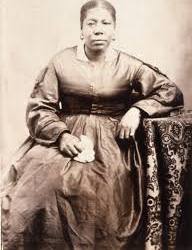
A significant Black Latter Day Saint from the early church was Jane Manning James. A woman from Connecticut notably made the walk from Buffalo, New York to Nauvoo, Illinois on foot, with most of her family. This was only after being separated from the group of recently converted latter day saints in Buffalo, possibly due to their race. Jane was baptized in 1842 by missionaries in her home state of Connecticut. She recorded these things about her journey and arrival to Nauvoo and her faith when asked to recall her life living with Joseph Smith in 1905.
“When I went there [Nauvoo] I only had two things on me, no shoes nor stockings, wore them all out on the road… They [Joseph and Emma] was looking for us because I wrote them a letter. There was eight of us, my mother and two sisters and a brother and sister-in-law, and we had two children, one they had to carry all the way there, and we traveled a thousand miles.”
She was sure in her belief of the Restored Gospel of Jesus Christ and Modern Prophecy. She says in her recollection, after seeing that Joseph Smith Jr was indeed the man in her vision in Connecticut, that “This is the Gospel of Jesus Christ and there will never be any other on earth. It has come to stay.” Sister James would later go west with the saints under the leadership of then Apostle Brigham Young.
--------
me tumblr posting again:
thank you for the example set Sister James on faith, dedication, and perseverance. She also had spiritual gifts, such as speaking in tongue and faith healing. She believed following the gospel, knowing it was a key to a better way of living life (for her.) it wasn't easy for her, and yet, i think the faith community i observe today (and mormonism in general) is better, just for her having lived it.
may she be at peace, and in a manner God, Sister Jane herself, and her family she led that meant so very much to her, see fit.
#the church of jesus christ of latter-day saints#latter day saint#afrostake#tumblrstake#mormon#mormon history#mormonism#religion#they dont mention anything about sealing bc we don't have it#most reorg saints don't know it exists nor that it was ever practiced#its simply assumed that will be the case. that your family will be there (and that there will be work to be done)#so i say it is unlikely that Sis Jane is actually eternally sealed to the Smiths as a servant bc God is no respecter of persons#who even said that Joseph is in the CK. he could be in the Telestial Kingdom rn as we speak. depending on how time / resurrection day works#Jane may be in the CK maybe having a sisterly relationship with Emma if that's how the afterlife works#i also don't believe the kingdoms are permanent. as a side note. if Joseph Jr ain't there i think he can be in God's time.#and josephites (reorganized saints) don't have a way to report card which kingdom they'll go too#and nobody talks about it bc its the afterlife and community of christ doesnt focus (or sometimes doesn't even care) about the afterlife#i've heard it talked about in depths twice and in general maybe 4-5 times. know a brother i meet with weekly who is newly widowerd#no one seems to think the work is over and that we well still be working and progressing in our faith helping others progress after death#that one is cultural - may come from common unwritten- early lds belief since L-dSaints have a new direction and more developed idea of thi#but for the sake of all sakes#can they not reseal her?#certainly a prophet could - listening to Gods call of liberation - see the symbolism and cultural moment that could be#or does post mortem sealing go off the rails? i don't go here. its often sweet and i think harmful in some ways too. JS Jr would Just Do It#but alas - i dont think emma should be involved with any of that. she wouldn’t want to do anymore sealing#i just think if you can do a baptism after death why not a sealing. but doing one would perhaps open a floodgate?#but perhaps its time for those many church generation Black families to be able to have that with they're bygone relatives#once i gave a mourning period & lively death procession & lively dance celebration on the alantic coast to#to honor all my ancestors/ predecessors who were killed and thrown into the sea or would rather die than be enslaved and jumped#danced in the same ocean they died in and dumped (state park approved) flowers into the sea
6 notes
·
View notes
Text
Research: Project Finish
Tim Sale
Tim Sale is a famous comic book artist, who had worked in several titles along with the writer Jeff Loeb, including Batman, Spider-Man, Superman, Daredevil, and many others.
Tim Sale was born in may of 1956, in New York, where he studied visual arts, spent a good time of his life in Seattle, and today he lives in California.
For some years he drew his art privately, only to please himself. When he found himself working at a fast food in his late twenties, however, he decided to try to sell some of his work. This led to an association with Thives’ World Graphics, a fantasy anthology series, where he illustrated stories.
What most marks his work is the dramatic aspect that he manages to obtain in the characterization of his characters and in the scenarios he creates, making the stories unique and immortalizing the characters.
The union of Sale’s art with Loeb’s engaging narrative has become the perfect marriage for mysterious plots.
One of the most striking characters worked by Sale was Batman, which he drew “The Long Halloween”, “Dark Victory” and “Halloween”. He was able to fully transfigure the dark aura of Gotham and his Dark Knight. He also worked with Superman in the saga “ Superman for All Seasons”.
Both of The Long Halloween and For All Seasons are what is known as “Year one” comics. These works take their heroes back in time to their earliest days of crime fighters.
His main tool is watercolor, which he uses with mastery. Sale's palette of colors is something really impressive, always drawing and painting his characters very delicately, and calmly. His style is very cartoonish, although this does not diminish his art in any way, on the contrary, his style is very unique and characteristic.
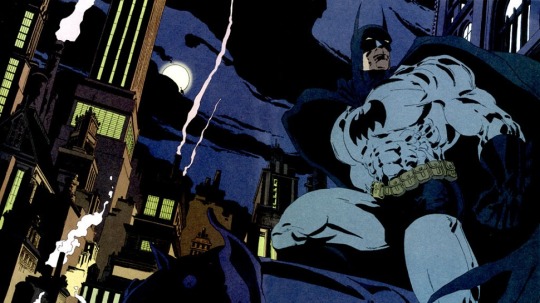
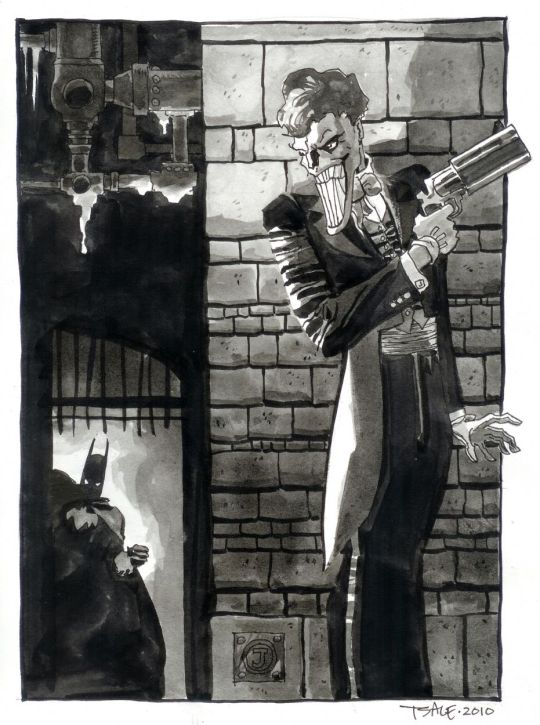


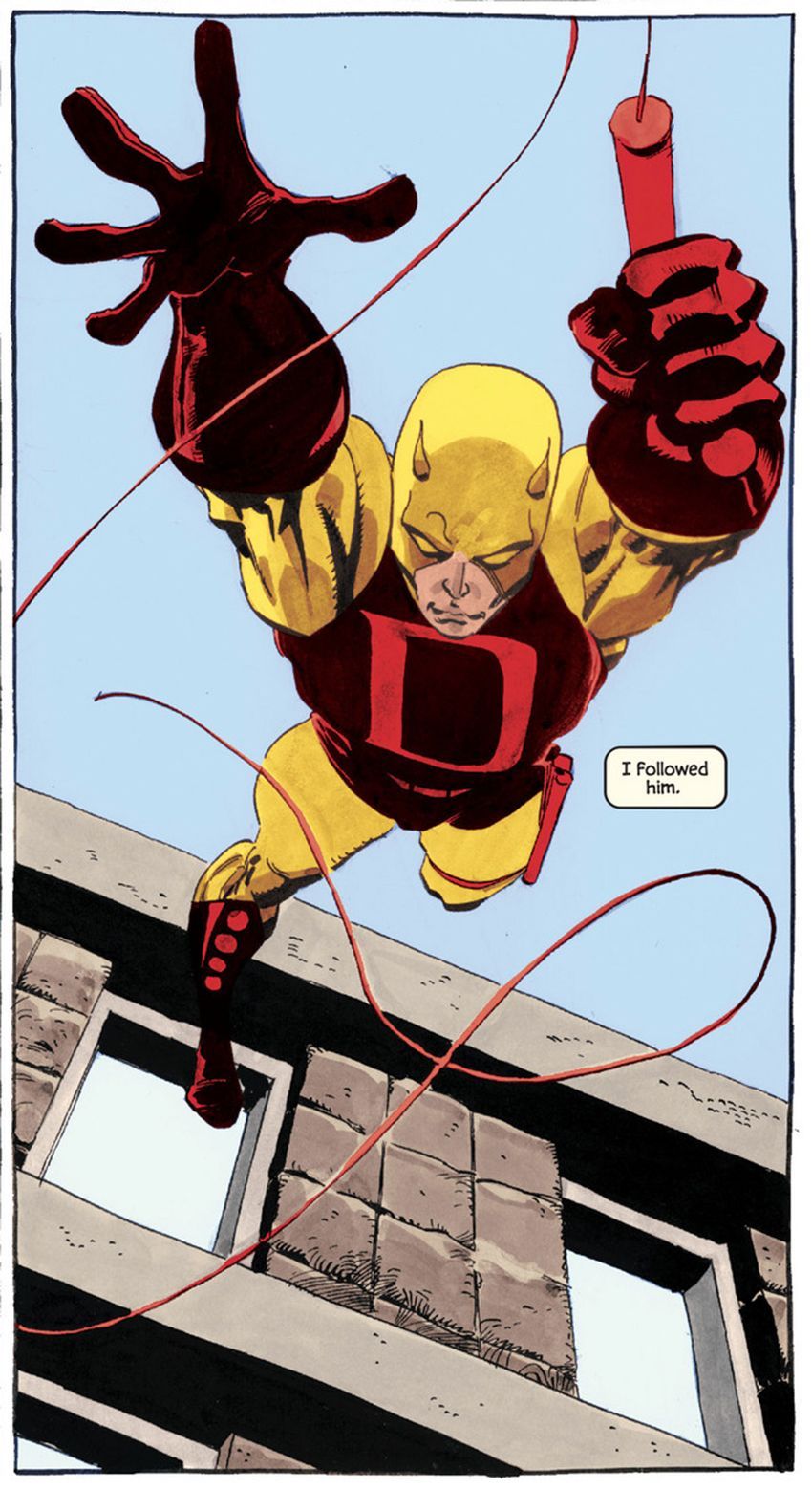
Pedro Franz
Is a Brazilian comic book artist, who was born in Santa Catarina and has a degree in design.
He has been publishing several comic books and participating in exhibitions in Brazil and abroad. As an illustrator, he has published works several magazines and books, and regularly collaborates with the Piauí magazine. As a graphic designer, he is a contributor to the Par (Ent) Esis platform. He has comics translated and published in English and Spanish, and has good international recognition, thanks to his publications.
But what is most impressive in Pedro's art, perhaps is his intensive use of colors. Mixing various shades of different colors, mixing different compositions. In addition to sometimes using characters from pop culture, with his elaborate style.
Despite liking traditional comics, he has always published and worked for national publishers, often with authorial works.
Perhaps his best known work, which was even published in the United States is the comic “Suburbia”.
Suburbia tells the story of Conceição, a girls daughter of enslaved rural workers, who flees to Rio de Janeiro in the early 1990s. In the city, Conceição begins to work as a cleaner and to get involved in the world of funk, slums and poverty.
His drawings are extremely surreal, not exactly following a traditional way of making comics, with several images spread across the page, with different shapes and sizes, with extremely strong colors, mainly valuing blue, purple, yellow and red, as his main colors.

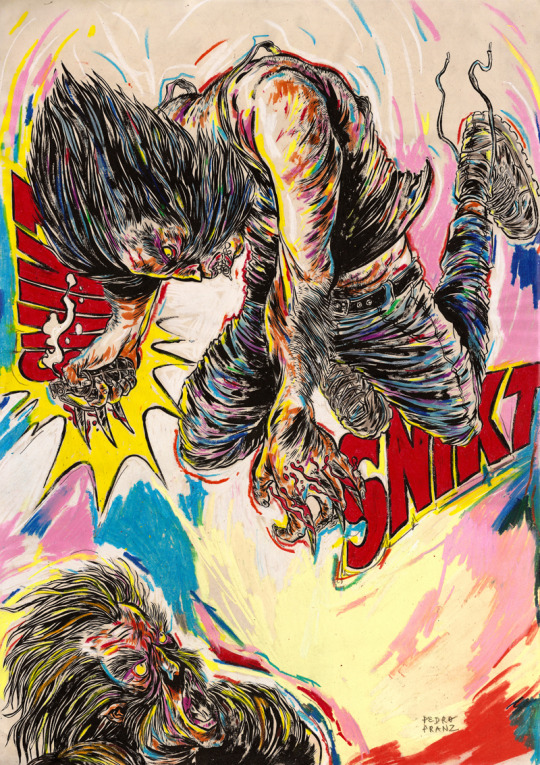
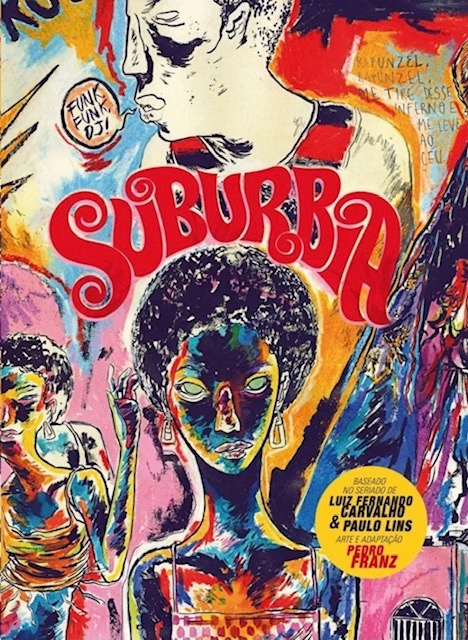
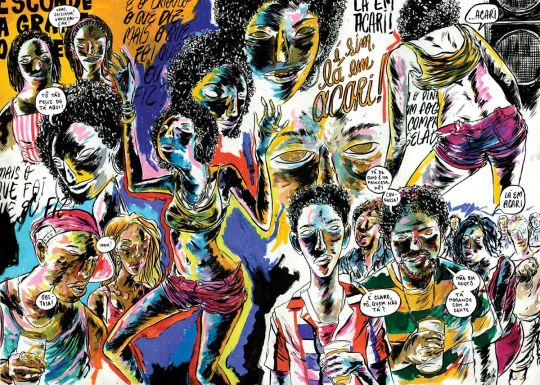
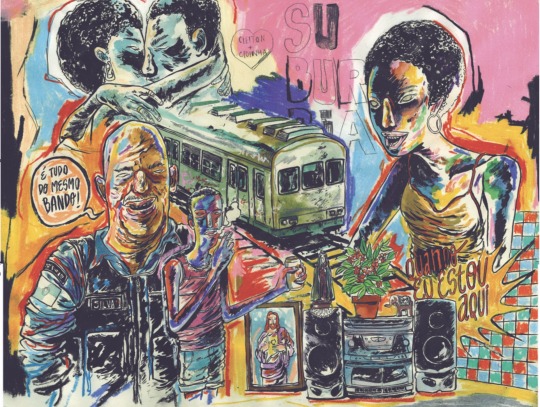
Richard Corben
Richard Corben was one of the contributors of elevating the comics to the category of Art, and of its unparalleled style of great influence among many current artists.
Richard Vance Corben was born in Missouri, United States on October 1940, in a family of farmers in the middle west ( where he started reading comics), and lived in Kansas City. There he studied Fine Arts, got married, had a girl and started working in local cinematography animation company. At the same time, he started to create and publish some underground fanzines. From the begging it was clear that he was interested in science fiction, eroticism, and total rejection of institutions ( the Army, the Church, etc), mixed with a lot of humor.
At a young age, Corben was an aficionado of bodybuilding, just like everyone who was interested in a persons aesthetics. The first character that he created, was Rowlf, a dog who took on a human form. In the beginning of the 1970s he amplified his work ( and his fame) in some underground magazines. And in 1971 he started working for the Heavy Metal publisher where he created one of his most famous characters, Den a large muscular man, who was always naked, and always after some adventure.
Corben has a very particular style, with unsettling mixture of caricatured, often satirical grotesque and intense,convincing realism. Never before had such wildly cartoonish worlds proved so convincing.
Also he can handle an exponentially higher standard because of his ability to use colour to show the effect of light on whatever he’s depicting. The way that he mixes light and colors in certain panels to differentiate those elements from each other, is something to admire.
Corben worked in a few mainstream comics, he always preferred to work with authorial works or working in specific themes like fantasy and science fiction comics and not so much on superheroes.
But probably the most famous mainstream comic that ever worked was the character Hellboy, along with writer Mike Mignola.
Hellboy is a series of comics that has a lot of mysticism, Norse mythology, horror and monsters. Something Corben certainly agreed to do, without thinking twice.
Richard Corben is one of my favorite artists, with a style that is perhaps not as realistic as an Alex Ross for example, but the humor and beauty that he puts in his characters is very unique.
Corben died on December 2, 2020, leaving a great legacy, for the world of comics and arts, with a very unique style and extremely stunning worlds.
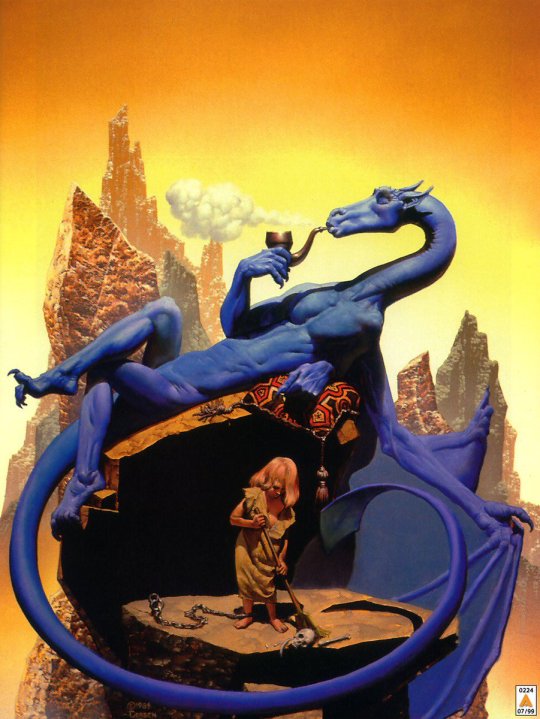
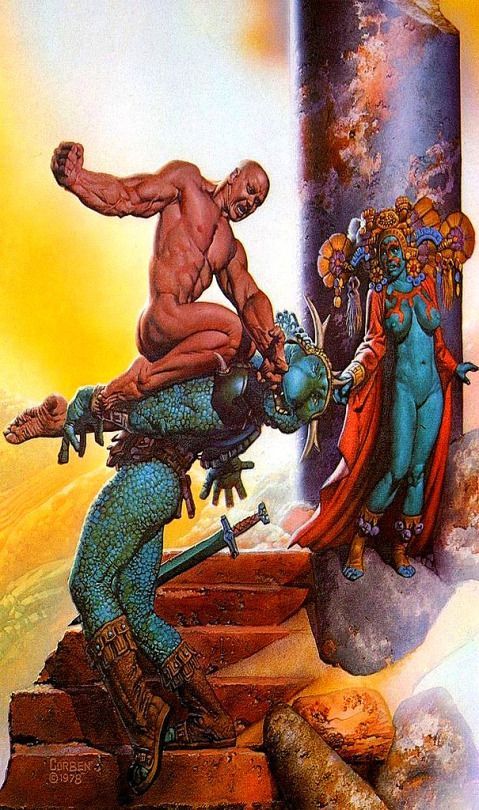
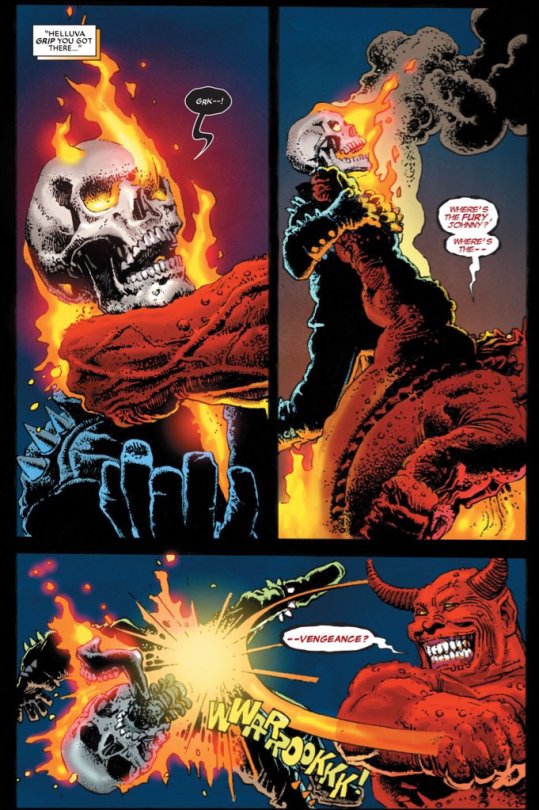
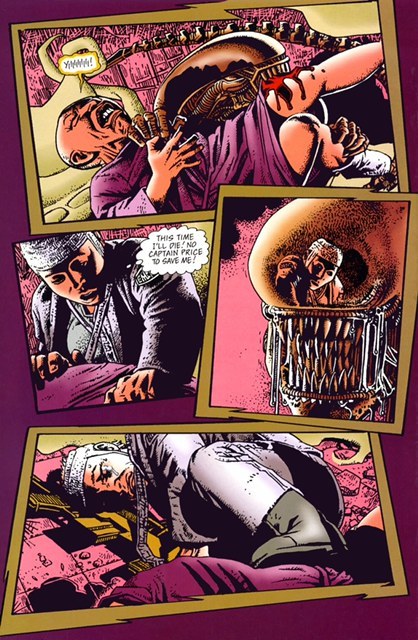
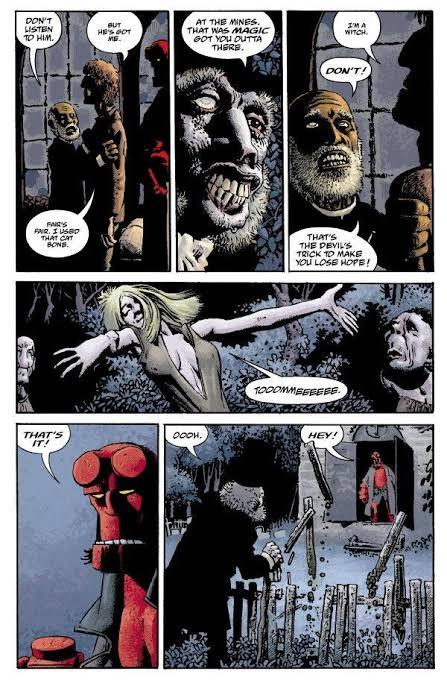
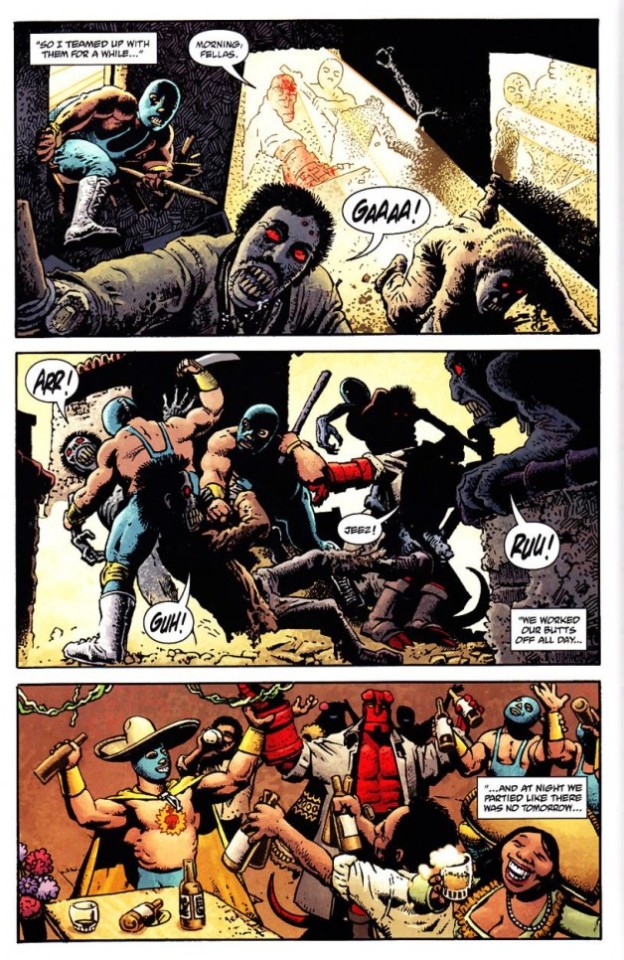
Charlie Allard
Charlie Adlard is a British comic book artist, who have worked on the comic industry for over 25 years. He spent the majority of his time since 2003 working in The Walking Dead along side with writer Robert Kirkman , until the last issue on 2019 He started reading comics when he was very young, and he said that he was very lucky to have influences of American comics and the more high art, such as Asterix and Tin Tin. He was fascinated by European comic books artists like Moebius, Alberto Uderzo and Herge. He started his career as many British artists and writers, working on 2000 AD, with characters such as Judge Dredd, Armitage and eventually Savage. In the United States he started working with the X Files, Astronauts in trouble, and of course The Walking Dead. Adlard started in The Walking Dead from issue 7, and brought a slightly different style, from the previous artist. Adlard's art is very cartoonish, but the universe of The Walking Dead still doesn't get silly because of it. Quite the opposite, the dirt and rot that Adlerd puts on his characters and the world, only sustains what a horrible world it is to live in. Many readers complain about Adlard's style, being very simple, that his characters are very similar, and sometimes it is difficult to identify them. But I believe that although his style does not vary much, when it comes time to show a horde of zombies, a devastated city, people feeling despair, and extremely disturbing scenes, Adlard manages to excel. Adlard's main tool is ink. All The Walking Dead magazines are in black and white, and he manages to give a lot of depth to the scenarios and characters using only a few ink stains. Today Adlard is doing some comics, mainly for DC, but says that he does not intend to work with Kirkman and zombies again, because he wants to explore other themes, and to innovate his drawing skills.
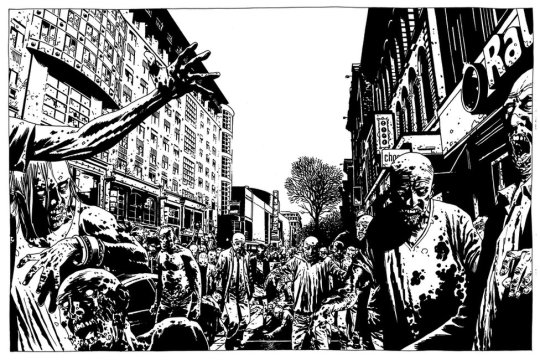
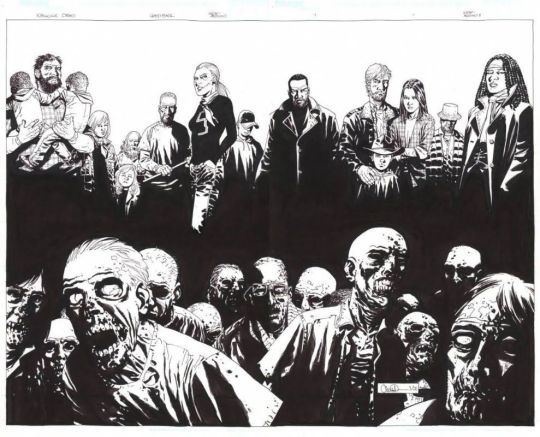
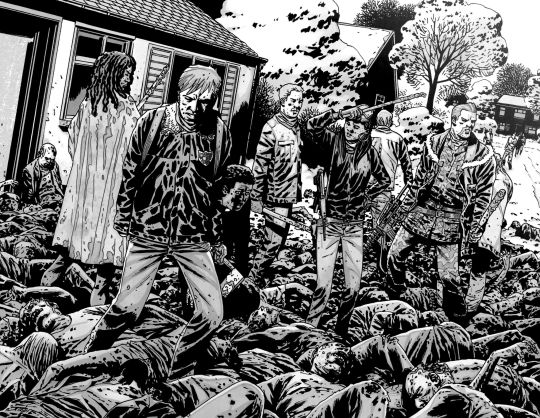
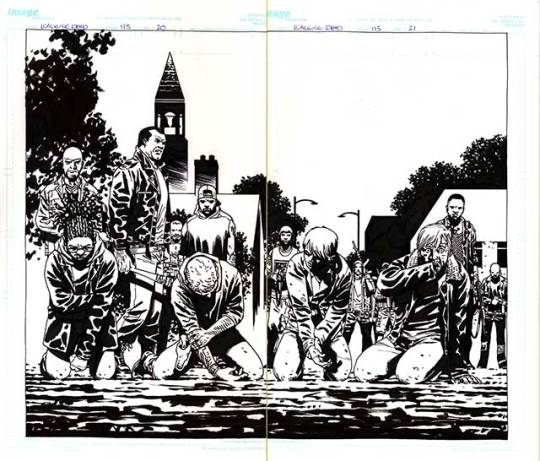
Zaha Hadid
Zaha Hadid was one of the most important and well known figures in contemporary architecture and design. With a singular trajectory, marked by a versatile, bold and out of the box style, she was the first woman to receive Pritzker Prize for architecture and was also the only female representative honored by the Royal Institute of British Architects with a golden medal. Zaha Hadid was born in Iraq, more precisely in the city of Halloween, in Bagdá, in the year 1950. Her family was of high class, her father being an important politician and her mother an artist. Still young, she traveled and studied in other places of the world, like London and Switzerland, but it was in her native land the she got her first formation, when she graduated in mathematics. At the age of 22, in 1972, she enrolled in one of the most famous independent schools of architecture in London, and there she gave the starting point to her career by studying and creating an important connection with the Dutch architect Rem Koolhaas, a figure that encouraged her and opened the doors for opportunities. Later in the 1980s, Zaha Hadid decided to open her own office. This, Zaha Hadid Architects was born, which made her name and talent recognized worldwide. Known for her works with futuristic lines, clean and pure forms, as well as the fragmentation of architectural design. Her projects and discussions raise issues that put architecture and its future to the test. This is because the architect seeks in her works to interrelate design, architecture and urbanism. I knew Hadid and some of her works, but it was the recommendation of my teacher Lauren, that I should look for this architect. As my project takes place in the future, she recommended that I look at some works by Zaha Hadid to get inspiration when creating the scenario for the comic. I find it very interesting how her works have this futuristic aesthetic , because it reminds me of science fiction films like Blade Runner with those skyscrapers and buildings with different shapes and sizes that are extremely imaginative that could only exist in films. With unique works and projects, famous for their exuberance, futuristic elements, curves, non linear shapes, distortions and fragmentations, Hadid inspired and generated fascination both for her constructions around the world.




Syd Mead
Syd Mead was a designer, best known for working on films such as Aliens, Blade Runner, Tron and Star trek. Mead was born in Minnesota, United States, on July of 1933, but five years later he moved to a second house in the western of United States prior to graduating from High School in Colorado in 1951. Some years later, he did the Art Center School in Los Angeles, where he graduated with great distinction in 1959. He was immediately recruited by the Ford Motor Company. At Ford he worked in the advanced styling department, creating futuristic concept car designs. But his imagination went beyond cars and he began to imagine clothes, helmets, buildings and scenery from hyper advanced civilization. After Ford, he also worked in other big companies like Chrysler, Sony and Phillips. After that he started migrating to the concept art world of movies. Mead is really important for generation of writers of science fiction, because many of them were influenced by Mead’s colorful paintings. Mead never wrote a novel or short story. He imagined the future in his mind and turned that imagination into illustrations. In 1979 he designed the extraterrestrial spaceship for the first film “Star Trek” in the cinema. Ridley Scott called Mead to design the buildings and flying cars of the futuristic Los Angeles “Blade Runner” in 1982. In 1986 he was hired to design the space station and vehicles of the movie Aliens directed by James Cameron. Almost at the same time, the designer created the electronic world of “Tron” for Disney studios. The same ones who hired him in 2014 to design the futuristic city of “Tomorrowland”. Mead died in 2019 after three years of lymphoma, he was 86 years old. He was a great influence for many designers and science fiction writers and illustrators, due for his creative worlds and automobiles , Elon Musk quotes Mead as one of his major influences, on visions of the automotive future and design in general.





Transmetropolitan by Warren Ellis and Darick Robertson
Transmetropolitan is a comic written by the British writer Warren Ellis and the American illustrator Darick Robertson, published by the Vertigo label, and falls within the cyberpunk genre, and the problems that rampant technology will cause us.
Throughout the 60 issues of Transmetropolitan, Ellis and Robertson build a chaotic and brilliantly alive future, presenting a sci-fi society with a peculiar mix of elements of cyberpunk, political dystopias, bioengineering and transhumanism, sexuality, economics and much more.
In a dystopia, in a not so distant future, the journalist Spider Jerusalem is isolated for fiver years in a hut in the forest, but he has to return to the city to earn some money.
Throughout the comic, amid a nihilistic aura that humanity has no salvation, the author- Warren Ellis - criticizes the consumerism and futility. The illustrations, of Darick Robertson, is full of excesses as the environment should be, a brand of the style of the 1990s.
The search for the truth is the central theme of this work, and in the midst of all this we found ourselves in a investigative odyssey that involves the lowest scum of that society ( thieves, murderers and rapists) until reaches the highest of the scum ( the presidency).
This background allows the work to touch on the most profound social themes, and without fear of saying what needs to be criticized, this is where Transmetropolitan shines, and provoke deep reflections on issues such as racism, the influence of media, the power of religions, the education, and many other themes.
In short, Transmetropolitan dissects and criticizes everything, it points out the flaws, the lies and the hypocrisy of each one. It’s a study about the problems of democratic society in the 21th century.
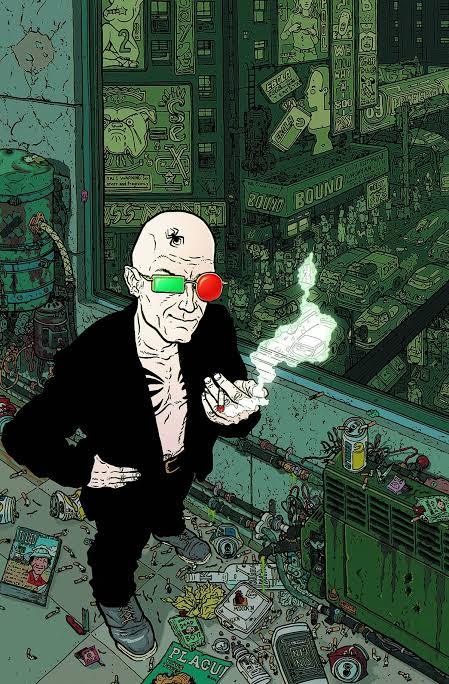
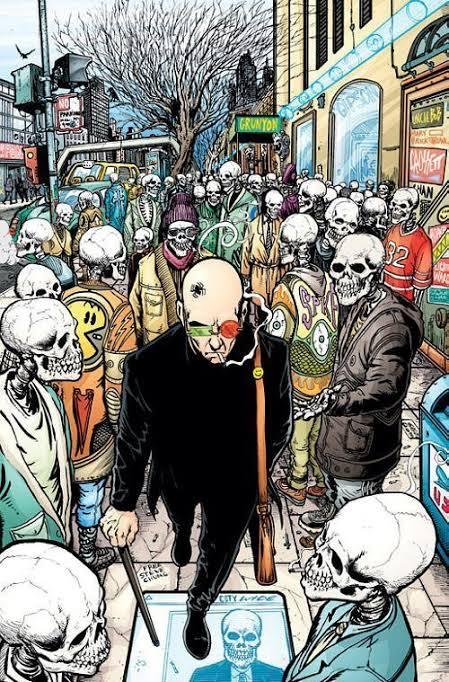
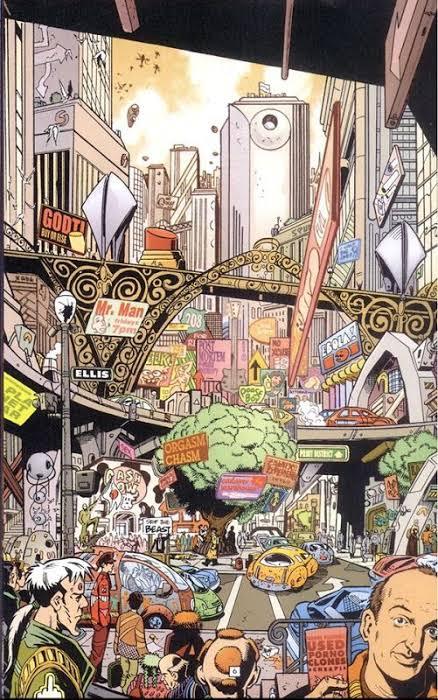
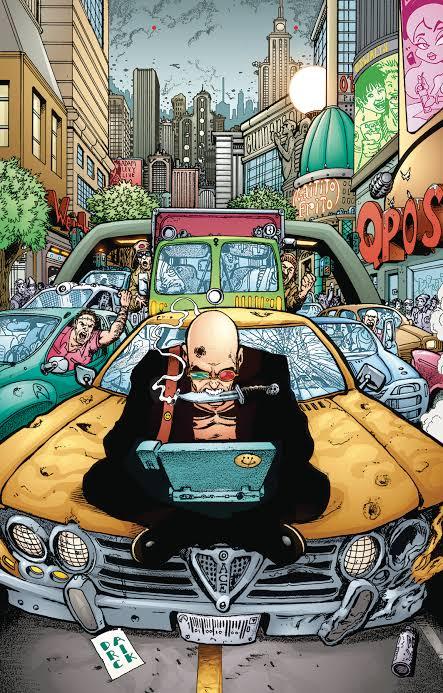
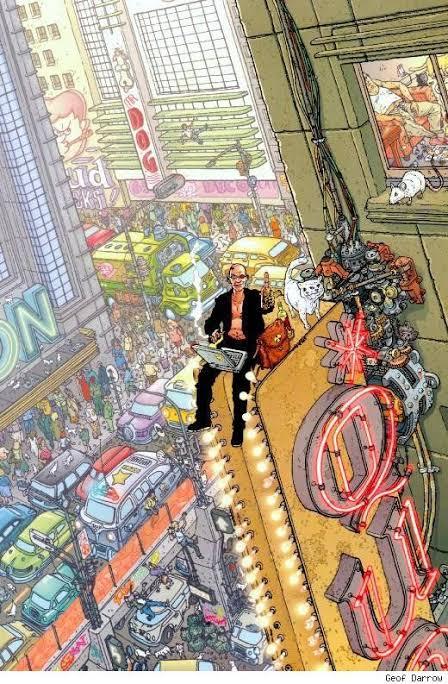
Jon Mcnaught
Jon Mcnaught was born in 1985, London, England. He work with drawing comics, and work as an illustrator, printmaker and lecturer. After spending several years on the Falkland Islands during his childhood, which will inspire his second book, Pebble island. The book pass years after the war, where he tries to recreate his childhood, with aspects of his curiosity, when he was exploring abandon bunkers, where it was just part of landscape, or somewhere where he could play. His work has essentially been landscape print-making (often situated in the city), but with quite simple intention of capturing the sense of space, light, time etc. His work is mostly about that, places that he was interested in depicting, and trying to reproduce the visual. He want the characters to feel like elements of a landscape or an environment ( he preferes to focus more on the background, than the characters itself). But usually he uses figures and postures to suggest expressions rather than close ups showing facial features. What I like about Mcnaught's work is that they are simple designs, but the colors are very vivid. The way he constructs the scenarios is very invective, because it doesn’t need to be extremely detailed, he just needs a few lines to show what he is talking about.
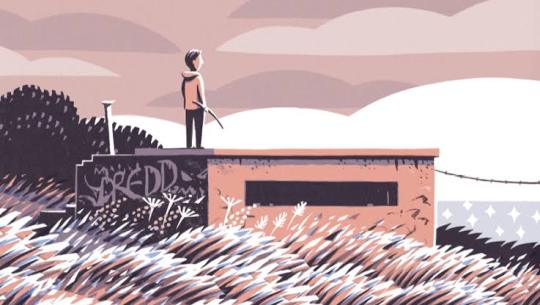

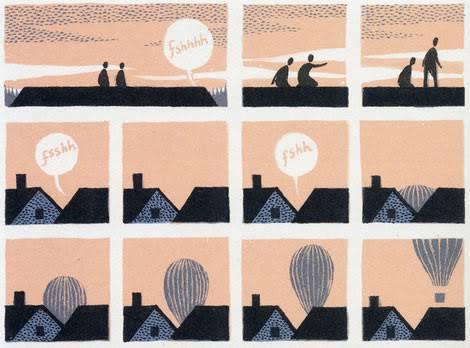
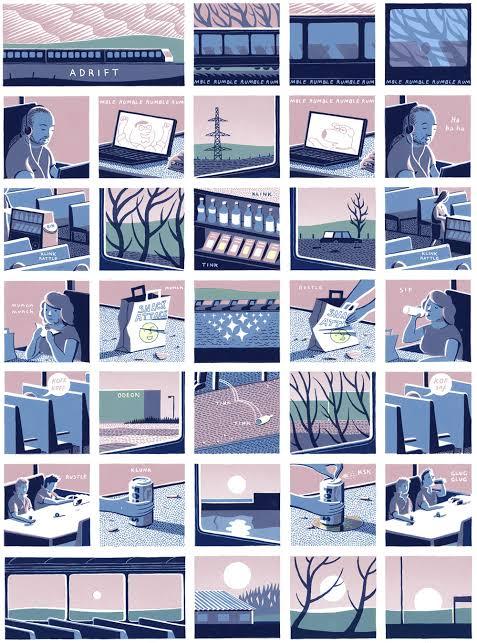
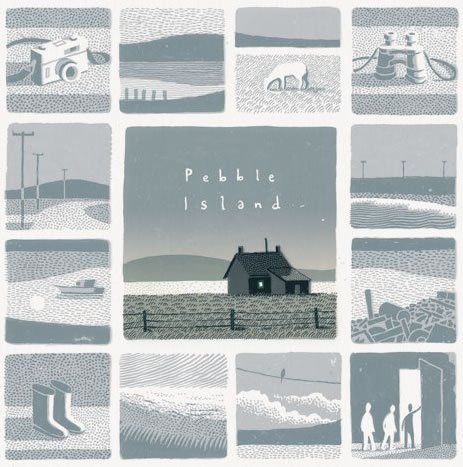
13 notes
·
View notes
Text
Cheat the Church of Integrity — Strip the Sanctuary of Truth — Compromise the Cult of Society — Life is YOUR Game
The Political Game at a “Twenty-Twenty” Glance — Mavericks Want a Chance, Not a Stance
“Let your life be a counter-friction to stop the machine. What I have to do is to see, at any rate, that I do not lend myself to the wrong which I condemn.” – Henry David Thoreau (Civil Disobedience)
“Truly it demands something godlike in him who has cast off the common motives of humanity, and has ventured to trust himself for a taskmaster. High be his heart, faithful his will, clear his sight, that he may in good earnest be doctrine, society, law, to himself, that a simple purpose may be to him as strong as iron necessity is to others!” — Ralph Waldo Emerson (Self-Reliance)
(Emerson and Thoreau were essentially family — and while I have been inspired by both, here you will find a handful of quotes from Emerson, as his masterpiece, “Self-Reliance,” could not be more beneficial to the individual than it is now, in the 2020s.)
My most recent disappointment with political ideology falls within the realm of vocabulary. Perhaps what is most disturbing is the reality that the term “liberal” has been so recklessly thrown about without any regard for its etymology. It is derived from the Latin word liber, which literally means “free, unrestricted, unimpeded; unbridled, unchecked, licentious.” Yet, we witness today’s so-called liberals regularly begging for State intervention and regulation with regard to personal liberty. A proper example of a liberal should be a growing adolescent seeking to free himself from the grasp of authority…but logic is defied once we realize the actual example is that of a desperate child, seeking to be coddled. Theorists have attempted to justify this by qualifying the term (i.e., classical vs. modern liberalism) – and new terms have arisen, such as “New Left,” in an attempt to settle confusion. However, this is all hogwash. I don’t need an advanced degree in Political Science to understand what “liberal” truly means. My well-informed, logical intuition is not subservient to the convoluted academia surrounding the righteous experts.
“When private men shall act with original views, the lustre will be transferred from the actions of kings to those of gentlemen.”
While I could potentially dismantle many faulty terms at length, I will remain disciplined to focus on one additional term that particularly troubles me: reactionary. On the widely familiar models of the traditional political spectrum, we find this adjective to be located on the far-right. The common understanding is that people said to fall within this category have a tendency to drastically react to changes proposed by the Left. This implies that the Left actively brings about social change – however, the truth is, the vast majority of leftists do not bring about anything; rather, they merely advocate and petition. It is actually the State that is acting as the Shepherd and providing direction, whether it be at the democratic request of The People, or at the whim of the mighty staff He wields. The sociopolitical stance of the State may waver at any time as it makes its own revisions, and meanwhile, both sides of the spectrum react in some way. If the changes imposed by the State favor the Left, then the Left will react favorably and vocally support the changes, while the Right reacts unfavorably and denounces them. The reverse can occur just as easily, where the Left will react unfavorably and criticize changes made by the State of which they do not approve, while the Right cheers on.
“…Most men have bound their eyes with one or another handkerchief, and attached themselves to some one of these communities of opinion. This conformity makes them not false in a few particulars, authors of a few lies, but false in all particulars.”
All of this behavior, on both sides, is reactionary, if we are – once again – to pay respect to etymology and logic, rather than outmoded definitions. If anything, “reactionary” is meant to be a replacement for both “liberal” and “conservative,” or “Democrat” and “Republican.” These latter labels, much like a magnetic field, can suddenly and drastically flip, depending on societal circumstances and the motivations of the State. In this instance, to introduce additional terms such as “Modern Democrat” or “New Republicans” to the mix would be ridiculous. It would be better to simply call them all what they truly are: mindlessly reactive sheep. Additionally, we have radical extremists on the far-left and far-right, exhibiting more potent behavior in an effort to lead in tandem with the State. They are the rabid sheepdogs — not heroes for the sheep as many would claim, but instead, the most devout servants to the Shepherd.
Allow me to clarify my use of the word “mindless” in this context. Mindlessness is the opposite of mindfulness, which is the ongoing practice of pure self-awareness. Since we have spawned, we have been crafting stories about ourselves within our own minds. These stories are fiction…but more crucially invigorating is the fact that we, the egos, are the perpetual authors of this creative fiction. You are not merely a profile of predetermined, prepackaged personality traits and qualities; you are the architect of your ongoing life experience. This means, whether you believe it or not, you are always in control of your story.
“These are the voices which we hear in solitude, but they grow faint and inaudible as we enter into the world. Society everywhere is in conspiracy against the manhood of every one of its members. Society is a joint-stock company, in which the members agree, for the better securing of his bread to each shareholder, to surrender the liberty and culture of the eater. The virtue in most request is conformity. Self-reliance is its aversion. It loves not realities and creators, but names and customs.”
The mindless sheep do not trust themselves enough to fearlessly lead their own lives, so they follow a sheepdog of their choice. Additionally, the rabid sheepdogs on both sides of the spectrum have immersed themselves in the Political Game so deeply, that they have all but lost the pages of their unique, individual stories; they have been trained effectively. Their insistence, deliberateness, and passionate leadership seem to resemble mindful self-authenticity, especially when compared to the robotic behavior of the sheep; nevertheless, their passion is a mental addiction beyond their control. They are but mindless slaves to their own deeply-rooted convictions, mostly due to the Shepherd’s Pavlovian tactics.
Continuing with the political spectrum…Centrists, on the one hand, are mindlessly moderate — moderate because they support a balance of social equality and hierarchy while trying to avoid drastic change, and mindless in the event that they still have faith in collectivist politics at all, while lacking faith in themselves. They are merely undecided, and usually do not possess the wherewithal to take the plunge into pure individualism. They would rather be provided with a narrative than write their own. They are sheep trotting in circles.
Now, let us examine the mindful radical, who is synonymous with the anarchists and insurrectionists. He is very much in touch with his individualism, very much desiring to denounce the contrived narratives being spewed out by the Shepherd and His dogs, and very much in opposition to the collective hive mind. He is the antithesis of the mindlessly radical sheepdog, who is consumed by authoritarianism.
However, deep within the grottos of his soul — as much as he despises it — even the mindful radical knows he has something in common with his arch enemy.
In the spirit of the yin-yang, the mindless radical — on one side — is overwhelmingly dependent on authority and virtue…but he still carries with him a faint memory of a time when his unyielding passion once served himself — a time he wishes to forget. He is able to suppress this memory somewhat easily, because his efforts are positively reinforced by so many who share his position. The mindful radical, on the other side, is overwhelmingly independent…but he still carries with him a faint memory of a time when his unyielding passion once served the collective — a time when he believed the system could work in favor of all, and thus in favor of him. It is this weakness that the other side thrives on, as they ever-so-steadily try to turn him around, and ever-so-gently guide him back to pasture. He must be so careful not to succumb, for this would reveal to him that he is not in fact the fierce and mighty wolf he fantasizes about and so helplessly wishes to be — but only a black sheep; unique from the others, perhaps, but still a sheep.
This leaves us with the mindful moderate — perhaps the most ideal position to take, if one only has the audacity. The mindful moderate is the wolf in sheep’s clothing, and ultimately the biggest threat to the State. The Shepherd may contend with the radical wolves at first, as they are more readily disruptive. However, the Shepherd does not remain idle once the hunt ceases, for He is always peering into the distance — on the lookout for a wolf in disguise — which He will later detain and retrain…or destroy. The State’s Orwellian methods of mass surveillance are living proof of this. Much to the advantage of the mindful moderate, the general public is still grappling with him, mostly because he is hard to spot…and even when he is discovered, his Machiavellian methods allow him to escape consequences. His peers grow increasingly suspicious of him, but he knows all too well that they’ve got nothing on him, for he has been refining his craft for years. While all of the mindlessly reactive sheep were trotting about, trying to keep up with the crowd, and wrestling with superficial matters, the wolf in sheep’s clothing has been imitating them, keeping tabs, and machinating all along.
Why does the mindful moderate keep to himself? Why does he ride the fence, while reaping benefits from both sides? Is he mentally ill? Is he a sociopath? Is he evil?
“Perhaps he’s emotionally injured. Yes, that’s it! He’s just depressed! If we cure him of his depression — if we shoot him up with drugs — he will be all better, and we can nurture him back to order!”
The mindful moderate has been hurt, for sure…but the same holds true for all the others. The mindless reactionaries on both sides entertain themselves with the notion that they are “normal,” while the radicals are simply angry, and the mavericks are hopelessly lonely and depressed. This is because sheep and dogs rule by day, when the sun is there to comfort them. However, when the full moon rises, it is the wolves that rule the night, for the darkness does not deter them. The herd huddles together to calm nerves as it beholds these outsiders howling from afar. When the bright and sunny illusion peters out, the sheep are faced with the horrid truth that these howls are not cries of despair; rather, these are pompous battle cries. The mindfully radical wolf is outspoken, while the mindfully moderate wolf in sheep’s clothing is quietly confident and sly. The mindless are ultimately jealous of this self-confidence, self-prioritization, and self-reliance, no matter how much they pretend to pity it.
“Your isolation must not be mechanical, but spiritual, that is, must be elevation. At times the whole world seems to be in conspiracy to importune you with emphatic trifles. Friend, client, child, sickness, fear, want, charity, all knock at once at thy closet door, and say,--'Come out unto us.' But keep thy state; come not into their confusion. The power men possess to annoy me, I give them by a weak curiosity. No man can come near me but through my act.”
The wolf pups once frolicked with the curious lambs, respecting them, until they were all segregated at the hands of the Shepherd and His dogs. The lambs were not at fault for this. The wolf pities the predicaments of the sheep — for he knows the nature of the sheepdog better than they. However, the hatred and fear emanating from the adult herd is far too strong to diffuse. It has been attempted time and time again. This hatred and fear fuels the determination of the mindful radical, who not only seeks to protect himself, but also to glorify the unbridled freedom and autonomy for which he stands. He climbs the highest mountains to maintain his stance.
In contrast, the mindfully moderate, Machiavellian maverick does not bother to fight for a stance; he simply wants a chance — the best chance — for personal success, happiness, and pleasure…or simply contentment. He knows his best chance will not come from fighting the current of a raging river, for even the mighty wolf cannot manage that. No, his best chance will come from waiting patiently, and riding with the current when it suits him. He will fight to defend his interests when necessary, but he knows that his best chance comes not from confrontation, but contemplation. His best weapon is not passion, nor brute strength, but intelligence. His inconsistency — his wavering is not to be mistaken for ignorance or confusion; it is his most effective self-serving strategy.
“A foolish consistency is the hobgoblin of little minds, adored by little statesmen and philosophers and divines. With consistency a great soul has simply nothing to do. He may as well concern himself with his shadow on the wall. Speak what you think now in hard words, and to-morrow speak what to-morrow thinks in hard words again, though it contradict every thing you said to-day.--'Ah, so you shall be sure to be misunderstood.'--Is it so bad, then, to be misunderstood? Pythagoras was misunderstood, and Socrates, and Jesus, and Luther, and Copernicus, and Galileo, and Newton, and every pure and wise spirit that ever took flesh. To be great is to be misunderstood.”
The maverick is not troubled — only misunderstood. Let us not underrate him, but understand him.
#egoist#egoism#egoist anarchism#anarcho-egoism#individualist#individualism#individualist anarchism#anarcho-pessimism#autonomy#autonomist#autonomism#anticiv#society#anarchy
9 notes
·
View notes
Text
169 - The Whittler
Let us go then, you and I When the evening is spread out Against the sky And pick up some Dell Taco for dinner. Welcome to Night Vale.
Beyond our town, past the Sand Wastes, in the Scrublands, sits the old general store. An oaken cabin style A-frame with boxed windows and a covered patio. On the porch there sits a swinging bench and upon that bench sits an elderly man, his face crumpled like a discarded letter, his eyes like tire tracks hidden beneath the shady brim of a straw cowboy hat. The old man holds a block of Elmwood the size of a potato in his right hand, and in his left, a carving jack. He whittles away at the knot of food, shaving off small corners, making detailed lines and indentations. The wood is all his world. And this world is quiet in his lap, on his bench, on his patio, before his general store amid the Scrublands past the Sand Wastes, which curl about Night Vale like the gentle but calloused hands of a father holding a newborn. As the old man whittles, he whistles sad songs with no words. But all those who hear the notes know they are bout loss. That they are about loneliness. But no one hears those notes. Not yet. No one sees the old whittler, nor his general store far out in an uninhabited stretch of desert. Not yet. If they did, they would wonder how an old general store, which was not there yesterday, was suddenly here today, a shop that by all accounts had weathered decades of abusive heat, wind, and isolation. They would hear his sad song, and the universal language of wistful sorrow would hide from them their understanding of time.
Let’s have a look now at sports. This Saturday night, the Night Vale High School Scorpions basketball team begins the district tournament. The Scorpions, having finished the season 18-2, earned the number 1 seat this year, but face some tough competition in their bracket. In the first round, they must battle another basketball team. This is logical, because most basketball tournaments feature other basketball teams. But the other basketball team is considered weaker than the Night Vale Scorpions, because a series of accumulated numbers indicates this is so. Should the Scorpions make it out of the first round and into the semi-finals, they would likely battle the number 4 seed, Nature. A tougher matchup to be sure, as Nature is unpredictable and ubiquitous. Nature’s style of play is best described as capricious and random, sometimes showcasing an array of flashy skills like sunny days, crystalline lakes, and otters. But Nature is a lockdown defensive force with effective momentum stoppers like lightning, quicksand, and poison ivy.
And in the finals, the favorites to compete for the title are Night Vale High School versus themselves, perhaps the toughest battle of them all, as each player must confront their harmful secrets, painful pasts, and darkest nightmares. Themselves are able to match the pace and power of Night Vale’s offensive and defensive sets, and we expect an excellent game. Good luck, Scorpions!
Most days the Scrublands are absent of humans, unapproachable and hostile. Today is not most days, as a line of Night Vale citizens has formed outside of the general store to see the old whittler and his wood menagerie. Parents ask for photos of their children with his work, and he only whistles and nods nearly imperceptibly. It could almost be interpreted as a slight twitch of the neck, rather than an affirming nod, but interpretations grow liberal when want is high.
Fathers and mothers snap pictures on their phones of children accepting gifts of wood figurines from the old man. The kids stare into the thin black ellipses that pass for his eyes, searching for the charming smile of elderly approval. But instead, seeing every single constellation of the night sky inside slits as thin as thistles and as black as tar. The historic expansion of the universe cannot be fully understood in words or even human thought, but it can be comprehended in the eyes of the tanned, wrinkled stranger.
The old whittler does not charge a penny for any of his work. He does not smile nor accept the many thank-yous coaxed out of the young ones by their manner-minded handlers. Nor does he accept requests. Children have many mascots, heroes, and cartoons that they love to possess via keepsake totems, and they repeatedly ask the old man for whittled representations of their favorite things, like Pokemon characters or one of Pixar’s anthropomorphic cars, or even Ted Allen, host of Food Network’s long running cooking competition “Chopped”. But the old whittler only carves what he carves. And he carves tiny horses, little cowboys, old-timey wagons, armadillos, tigers, tractors, almost anything you can think of. He finishes his sculpture of a koala bear and hands it to Amber Akinyi, who looks at her husband Wilson Levy, who is holding their sobbing, screaming 16-month-old baby Flora. The couple smiles together, never knowing that this balsa koala is everything they could have ever wanted beyond a loving family. Wilson begins to cry at the simple beauty of this craft. Amber begins to cry at the feeling of being understood, and young Flora stops crying as she fawns over the 6-inch tall antipodean marsupial, cartoonishly gnawing on a eucalyptus leaf.
The whittler also carves people. Small human figures, yes, like firefighters and ballerinas and clowns, but also actual people. Harrison Kip told the old man he wished to be happier in his own skin, and the old whittler grabbed Harrison’s cheeks and brought Harrison’s round, soft face before his own crinkled countenance, and Harrison screamed. He screamed in fear of what the old man was about to do. He also screamed in joyous anticipation, and the two screams were discordant like adjacent keys pressed simultaneously on a church organ. The old whittler pressed his knife against Harrison’s chin and began to pull the blade back, using the force of his thumb and the trunk of his forefinger. He repeated throughout Harrison’s assenting and defiant shouts, and after a few moments, Harrison stopped yelling and stood. His jaw squarer, his nose thinner and longer, his shoulders broader. And Harrison smiled.
Soon, the whittler began carving houses, roads, and city buildings. They were larger than the koala, much larger, for they were full-sized renditions of these things. He sliced and sawed away at block after block of red oak, hackberry and peachwood, forming new arteries of city travel, whole blocks of residences, and even cultural landmarks and venues. And the town of Night Vale, in a single late morning, began to expand into the distant and uninhabitable Scrublands of our desert.
Let’s have a look now at horoscopes. Gemini. Bury yourself in your work today, Gemini. Pile that garbage high and rest your weary head beneath its odorous, but comforting weight. Cancer. No more Mr. Nice Guy, Cancer. Today you are Mrs. Disinterested Lady. Get out there and be uninvolved in everything. Leo. You’re the talk of the town, Leo. Word after word is about you, and it is juicy! Like a rare steak, like a blood orange. Juicy like 2008 coutoure. Whew! You should hear what they’re saying. Virgo. You are not what you seem to be, Virgo. You seem to be a blackberry shrub, overreaching and prickly. But really you are a human, squishy and small. Continue to be the thorny fruit-bearing bush, though. Libra. You seek balance, Libra, but you are as lopsided as wealth disparity graph in an economist’s classroom. Share your worth, distribute your value fairly and compassionately, Libra, for the villagers are sharpening their tools. Scorpio. Hey Steve, love you pal!
Sagittarius. Your (-) [0:10:42] in relationships is going to be your downfall, Sagittarius. You’re an obsidian monolith, towering over everyone, absorbing all light, except the faint reflection of those who want to know what glows inside your stony façade. You don’t have to be a diamond, Sagittarius, or even quartz. Just try for salt lick, OK? I think you can achieve that.
Capricorn. Oh the games you play, Capricorn, you wicked little sea goat! You naughty caprine ocean dweller with your horns and scales, vexing us with your riddles and labyrinthian logic! The stars offer no advice for you, Capricorn, only envious praise. Aquarius. Put your money where your mouth is, but wash that money first, Aquarius. It’s been in so many other people’s mouths, ever since we added Jolly Ranchers as legal currency. Pisces. You’re swimming upstream, Pisces. Figuratively speaking, of course. I mean you are a human who does not need to actually swim upstream for food or a mate. Get out of the metaphorical stream and avoid the damage you’re going to do to your body and soul. Except for you, Tim. You’re a woodchuck, who is literally swimming upstream. I don’t like you, Tim, because you are eating my tulips. You can drown. Aries. Fake it til you pretend to make it, Aries. Taurus. Don’t hide your feelings, Taurus! Frame them! Display them ostentatiously on the wall. Mount them on plinths behind velvet robed (-) [0:12:33]. Curate an exhibit of your feelings, Taurus. Charge admission.
And now the news. The Night Vale City Council deliberated today on whether the old whittler in front of the old general store in the Scrublands was friend or foe to our town. Those voices arguing in favor of the old man celebrated the huge municipal expansion he was creating so quickly onto undeveloped land.
“This new infrastructure would have taken us dozens of years and millions of dollars to deploy, and he has accomplished it all in half day!” these voices said in unison. “Plus,” they added, “he whittled a little army man for my kid, a bracelet for my wife, and a sweater for our cat. It’s everything we ever wanted!”
The dissenting voices, and they were few, could only argue that he failed to acquire proper permits for any of this construction, let alone an outdoor vendor’s license which is mandatory even for giveaways. Excepting restaurant samples, marketing promotions, and military dispersion of chemtrails. The many-voiced, uni-bodied creature that is the City Council, huffed in nearly unanimous support for this old man. His sad whistling, his prolific whittling, and his beneficence to our city. “Did you see?” said there of the voices, “that inside the general store there’s everything you could ever need. Cans, boxes, shelves, counters! Walls. It’s amazing. Everything is craved from a single block of wood, and it’s all connected! No glue or bolts or rivets anywhere.” “He’s a deft hand,” concurred four other voices. “How does he even find single blocks of wood that huge?” wondered a solo voice aloud. “Whatever!” the entire City Council roared in unison. “That old man is a superb whittler!”
And now financial news. [hysterical laughter Ha ha hahahaha hahaha every-everything’s fine! It’s just dandy! Uh, thank you for asking.
And now back to our top story. Out in the Scrublands, an entire wooden suburb has grown from the withered hands and sharp knife of the old whittler, who has for the first time today, moved from the porch of his general store. He stands now upon a stage, a round platform on the center of a great amphitheater, which he personally carved deep into the cracked, red rock of the desert floor. The people of Night Vale gather and sit on wood plank rows, which curve in a semi-circle around the old man on the stage. Each person in attendance holds in their hands a whittled object given to them as they entered the audience space. The items are all different, esoteric, and unique, each item and unexpected gift of the whittler. Each item the very thing they have always wanted, even if it was never what they thought they wanted. They hold gently their presents, protecting them with their very lives. The whittler, with his straw hat still shading his keyhole eyes and riverbend mouth, stands before the people of Night Vale who sit in an arena of his own making, each cradling a beloved statuette of his own making. The old man reaches out and takes the hand of his bride. She, of course, is of his own making as well. She is craved of weeping cedar. Her veil, though entirely wood, is somehow translucent, and her sorrowful eyes are faintly visible behind the intricate work of the whittler’s blade. The old man whistles once again, and the crowd whistles along with him. They know the song now. It lives in them like longing, like blood. Like a soul. They know every word of the wordless (-) [0:16:51], and the notes of loneliness spread across the Scrublands to the mountains’ edge and echo back in the key of hope, with a lilt of contentment and satisfaction. They will only be happy when he is happy and he is, indeed, happy. As the whittler clutches the hand of his newly carved betrothed, the clouds part, revealing the happiest thing of all: The weather.
[“Embroidery Stars” by Carrie Elkin http://carrieelkin.com/]
Into the Scrublands I went, myself already as happy as I could ever be for I was with my own true love, my husband. I journeyed to see the whittler for myself, as an effort of journalism, a chronicler of interesting events. I wanted for nothing. My happiness cannot be improved. Or so I believed.
When I arrived, the whittler more than 100 feet a way, and through a mass of thousands, greeted me with a nod so unobtrusive, I believed it to be a trick of the eye. But from the distance, I could see the whole of the universe in those dark eyes under dark shadow, behind the final violet of sunset. I knew he meant me.
Carlos and I stepped to the podium, and the old man opened his palm to reveal an original carving just for me. I had hoped it was a Nintendo Switch, but it was a [sea plane] [0:23:05]. Carlos, like a child on Santa’s lap, cooed and asked the old man for a superconductive supercollider. And the old whittler, his burlap cheeks heavy with gravity and history, reached into the breast pocket of his (-) shirt and handed Carlos a tiny wooden rose. Carlos hugged his rose to his chest, and I my (sea plane). The whittler took the hand again off his bride and gazed upon her, her veiled eyes met by his boundless stare. They stood like that for more than an hour, not speaking. The only sounds were the cicadas chirping and the crowd whistling.
But the tune faded, and soon only the cicadas cut through the silence of a still desert twilight. And one of us, Larry Leroy, stood and walked on to the stage. He touched the old man’s shoulder. The old man did not turn. He did not speak. He collapsed into black ash. Then his bride, then the seats beneath us, it all gave way to crumbling nothing. Then the buildings and roads and even the general store turned into ash. Finally, every one of our object dissipated, like Eurydice almost free from Hades. A gentle cool breeze arrived to sweep our hope away.
We returned home, wordless, with occasional whistles of the whittler’s tune, once again in a sad and lonesome key. Our cherished gifts, we told ourselves, were nothing more than baubles, ephemera, however blessed or magical. They were mere things, not love, not family, not true love, they were objects, toys. Props. Distractions. They were everything we have ever wanted, because we could hold them, see them, touch them. We can no longer do that, but we can remember what it was like. The rough of the wood against the soft of our hand.
Stay tuned next for our new game show: “Name all the nouns!”
And as always, good night, Night Vale, Good night.
Today’s proverb: Give a man and a fish and he’ll wonder what your deal is. Teach a man to fish and he’ll ask you once again to please leave him alone.
40 notes
·
View notes
Text
Writeober #3: Bone
Gerlach Schwartztern cackled maniacally as he felt the bindings keeping him out of the world faltering. He had expected this, ever since he’d seen that the historical building where the ritual had been performed was scheduled to be knocked down. There had been three days of demolition, and finally, the sacred circle at the center had been breached. He was free!
“Hey! You! This is a hardhat area! You can’t be in here!”
Gerlach shuffled around – being bound out of reality, able only to see what was transpiring, without having muscles to move, had done no good for his physique, and all his muscles were stiff beyond belief – to see a man in a bright yellow helmet and a shining orange vest, yelling at him.
“Dost thou know to whom thou speaketh?” he said, smiling cruelly, raising his own bony fingers as he prepared to teach the fool a lesson.
“Come on, asshole. Don’t give me that Scadian shit,” the man said. “You need to get off the grounds. It’s not safe.”
“Unsafe for whom?” Gerlach laughed, and reached out with his power. He called out to the dead buried below and all around to rise from their graves.
Nothing happened.
“Unsafe for you, asshole. You. Did I stutter? Get the hell out of here before I have to call the cops.”
Where were the dead?
Now that he was looking for them, he couldn’t feel them. In the Old World, there had been skeletons everywhere. But he’d had to flee the witchfinders – not the idiots who accused old women with black cats and herbal knowledge of being witches, but the ones with real power, who hunted those with real magic – so he’d taken passage to the New World, four hundred years ago.
Life was hard, then. Many colonists died, and their skeletons became his servants. He’d terrorized the colonists and the natives alike… until mages of both groups had teamed up against him. The natives had used their magic to confine him within a single town, herding him to the colonist mages, who’d bound him and locked him outside the world so long as the runes and symbols they’d carved in the stone under a church floor remained intact.
Now that the church was demolished, and the stone broken, Gerlach was free. He’d been able to see the world from his prison outside it; he’d seen the population explode. Surely the dead must be everywhere! People still died in this brave new world, did they not?
“Very well, knave. I shall leave, if you direct me to a graveyard.”
The man in the yellow hat sighed. “I don’t have to do this,” he said. “You’ve been an ass. But fine. The new church that replaced this one is about two miles down the road, and it has a graveyard. I think you have to turn right on Whitman – or I dunno, maybe it’s Baker? One of those streets. Go in about three blocks, you’ll find the church, and the graveyard’s across the street.”
“Then there I shall go,” Gerlach said, picking up his robes – they were dragging in the dust of the construction – and walking toward the gate in the fence. An interesting fence, that, made of wires woven together loosely.
“Thank you is a thing, asshole!” the man called after him, but Gerlach did not thank his inferiors.
***
It took far longer to find the church than the knave’s directions suggested. Gerlach was calling down curses on the man’s entire family unto the seventh generation by the time he finally found it, his legs and feet screaming at him for making them perform so much work after just being embodied again.
But there it was. The graveyard. And now he could feel the dead, lurking below, waiting for his call. With them at his command, he would rule over this town – and others. As the dead came to answer him, he would grow in power, and he would be able to call more and more of them as his power expanded. Eventually he would rule over this entire nation. Perhaps even the world.
Gerlach took a deep breath, and then called to the dead.
He felt them respond, felt skeletons restless in coffins push against the lids.
And push.
And push.
“What transpires here?” he roared. “You should be rising from your graves! I have called you, and you must come!”
Skeletons still pushed against coffin lids.
“Why can you not come forth?!”
Some skeletons broke their wrists and fingers trying to push open their coffin lids. None of them succeeded in actually opening anything.
Gerlach tried for hours. And then he walked to another graveyard and tried again. Still the dead could not open their coffins. Gerlach was furious. Back in the Old World, only the most wealthy had even had coffins. And they were decorated wooden boxes that a sufficiently motivated skeleton could punch through. Here in the New World, four hundred years after arriving, apparently skeletons were all contained in unbreakable coffins.
He sank to his knees on the ground and screamed, his dreams of conquest dying just like the skeletons trapped in unbreakable coffins, and just as unlikely to rise under his power.
***
Elias Whittaker was furious.
The city had concealed the plans to demolish the old church until he was out of the country, and then gone through with the destruction. He hadn’t known about it until his daughter drove by the place and saw it destroyed. It had been a month.
None of the records of the Whittaker family, passed down from father to son (or daughter in some cases), had said anything about Gerlach Schwarztern being a patient and crafty man. A brilliant necromancer, yes, but he’d named himself Black Star in German for gods’ sake. He was not the type to lay low. So why hadn’t the city fallen to walking skeletons yet?
Could it be that Schwarztern had died in his prison, or perhaps died the moment he re-entered the world and time began for him again? Maybe all the aging he hadn’t done while he was trapped caught up with him at once.
But Elias didn’t think that was likely. From everything he’d read in the family tomes, carefully preserved for four hundred years, the crafters of the spell hadn’t thought it would do that. They had warned, over and over, of the danger should the binding circle they’d carved into the rock ever break or wear. All of them had passed on the knowledge to their children, but between illness, war, and adult children’s desire to strike out west to make a new life for themselves, far away from their parents… Now the Whittaker family was the only one left.
Elias had been on the Board for Historical Preservation, had argued for years that that tiny run-down little church needed to be preserved exactly as the city’s founders had left it, that it was nearly 400 years old and was a view backward into a past that America had almost lost, the early days of the colonies. And what happened? The moment he was out of the country, the rest of the Board caved in like a wet tissue and let the city government have its way. They were going to put up some mixed-use development there, townhomes and offices and retail all mixed together, somehow. And that was worth letting an ancient necromancer free in a world where almost no one remembered that magic existed, or how to invoke it. Right.
But there was nothing Elias could find to indicate that Schwartztern had escaped. No graveyards were disturbed. No records of dead people getting up and walking. No disturbances at the morgue.
His daughter Rebecca found something—a record of an old man who’d been caught in the Jewish graveyard, obviously digging up graves because several graves had shown signs that the dirt had been interfered with, holes and clods and piles of dirt all over the graves. The elderly caretaker for the graveyard was still spry enough to shoot at an anti-Semite committing a hate crime, though. Rebecca reported that the old caretaker didn’t know if he’d actually hit the man in the tattered black coat or not, but that if he had, he must have only winged him, because the man had run without sign of injury. Since then, members of the Jewish community had been taking turns helping him guard the graveyard, with their own guns, and there had been no further disturbance.
Oddly, the fellow hadn’t left a shovel behind, but Ira Friedburg, the caretaker, had never seen him carrying one, either. Maybe it was under his coat, and the bullet had hit it instead of the man.
Of course, Elias knew why Schwartztern hadn’t needed a shovel. The graves had been disturbed from the inside. But why had the Jewish graveyard been affected, and not the much less well-guarded Catholic and Protestant ones? Schwartztern might well have been an anti-Semite, considering that in that time period almost everyone was, but he had never shown a preference for any specific type of corpse.
For the first time in his life Elias was grateful for the Second Amendment. Gerlach couldn’t know of any firearm technology more advanced than maybe a musket. A small weapon that fired deadly ammunition with terrifying accuracy and speed was nothing Gerlach Schwartztern could have any experience with. And the Jewish graveyard had suffered enough hate crimes that the caretaker patrolled it with a gun, regularly, and was small enough that Schwartztern hadn’t managed to raise a single body before being caught at it.
It was frustrating and maddening. He searched for three months. No sign of Schwartztern anywhere. Had the man left town? Was he right now trying to raise the dead in New York City or Washington DC or something? Had he returned to his homeland? Wait, no, he couldn’t have done that without a passport.
In desperation Elias started going around to funeral homes, asking them if they’d seen a man of Schwartztern’s description – long graying hair, a long beard, pale skin, aquiline features, crooked teeth. None of them had.
Until Elias went to Baron and Sons Funeral Home, and was met at the door by a man who looked exactly like the portraits of Schwartztern that had been passed down, if the man had gotten a modern haircut, a shave, and gotten his teeth straightened.
Elias’ eyes widened. “Gerlach Schwartztern?”
The man looked surprised. “There’s not many who know me by that name,” he said, and called back into the funeral home. “Mr. Baron, there’s a man here who wants to speak to me specifically. I’ll take a break to talk to him and then return to the clock.”
“Sure, that sounds fine,” a man’s voice called back.
“How are you – Why are you – What, did you find religion while you were trapped? You were freed almost four months ago,” Elias hissed. “But you’ve raised nothing.”
“Not entirely true,” Schwartztern said. He had a thick accent, but it wasn’t quite placeable – which made sense, because it was from another country 400 years ago. His English, though, sounded plausibly modern for a foreigner. “Let us walk to the back.”
“Where the graves are, and where you can attack me?” Elias snapped.
Schwartztern shook his head. “There is a contemplation garden for the grieving. No funerals are scheduled now, so it is unoccupied. We can talk without interruption.”
Oh. Right. There wasn’t a cemetery anywhere near the funeral home. That was why funeral processions were a thing. He followed the ancient necromancer, bemused, to the garden. “Did you forget your powers? Or lose them?”
“I assume from your knowledge of my name that you were one of the guardians my captors must have left behind to keep me contained,” Schwartztern said. “You may call me Gerlach Schwartz now, though. Or simply Gerlach. Apparently this new age is one of great informality. And yet they don’t even use ‘thou’ anymore.”
“Uh, yeah, we got rid of that a while back,” Elias said. “And you’re correct. My family has been keeping watch. Everything I’ve read said to expect an insane necromancer who would do anything to rule over the living with the power of the dead. But here you are in a building with… maybe two dead people?”
“There are four corpses here, in fact, but you’re correct. Four corpses is far from enough to conquer a town with.”
“What happened?”
“Modern caskets,” Gerlach said simply. “In my day, only the wealthy were even interred in a coffin; most bodies were lowered into the bare ground. Apparently since that time everyone who dies is buried in an impregnable sepulcher called a ‘casket’, or they are burned to ash… except for the Jews, who bury their dead in wooden boxes that I could at least work with, before the Jew fired his weapon at me.”
He shook his head. “The weapons they have in this time! It would never work, raising the dead, not now. I have been watching some of their movies—” He put a strange emphasis on the word. “So many tales of dead rising and biting the living to make them a risen corpse as well. And in these tales, everyone has one of these terrifying weapons, and they can entirely destroy a corpse with them. Perhaps a skeleton would be more difficult to hit, but with sufficient ordinance, they would prevail over my skeletons as well. The creators of these tales added the part where the dead can bite and their bite kills to make it a believable tragedy, else none would believe that enough firepower could not overwhelm even the dead.”
Elias rather thought no one had done anything to the plots of zombie movies to make them believable, but he could see how a necromancer might have a different opinion. “So you’re telling me you’ve given up. That I don’t need to kill you or capture you because you aren’t interested in raising the dead to conquer, anymore.”
Gerlach laughed. “Interested, perhaps. But it will not work, and this I now know. There are far more dead today, but that is because there are far, far more living, and they greatly outnumber the dead. Most of the dead are locked away in boxes far too strong for a skeleton to break open. I know, for I have made them try, and try again.” He shrugged. “So it is not practical. And it is also hardly necessary.”
“Why unnecessary?”
“Men live like kings in your time, young man.” Elias was not a young man – he might actually be older than Gerlach was when he was trapped – but this didn’t seem like something worth arguing to a man born over 450 years ago. “You need no servants to bring you hot water for your bath – simply turn a knob, and hot water comes forth! Food of any kind can be had at any time, no matter the season! Music can play anywhere, whether musicians are there to play it, or not. Entertainments as rich as the plays put on for kings can play endlessly, never repeating, on a box of light in your home – a home which is heated in the winter and cooled in the summer, and both are done evenly, throughout the home, without risk of fire. And there are treatments for lice.”
That explained the shorter hair. “So you’re, what? Trying to be a good tax-paying citizen now?”
“I am told there will be great, great difficulties in becoming a citizen, as I cannot present papers to prove what nation I was born in, or what date, or when I came to this land. Apparently I am an ‘illegal immigrant’, and if I am found by the authorities, they will deport me… somewhere. Since my own nationality no longer even exists, I have no idea where. But my employers here are sympathetic.” He nodded at the funeral home. “I came here because I thought the presence of the dead plus the title Baron meant another necromancer was here, but that was not the case… as I suspect you know well. They’ve arranged for me to work here and learn their trade, for there are many techniques of preserving the dead that exist now but did not, in my day. Apparently they are paying me ‘under the table’, an expression I understand not, except to say it is a means of paying one with no papers to prove their identity.”
“It means they’re paying you in cash and not taking out your taxes, so I guess you’re not a taxpayer after all.”
“In my day, taxes were paid in grain.”
“Sometimes money is referred to as ‘bread’ in this day and age, but the days when you could actually pay tax in grain are long behind us.”
“I do realize that,” Gerlach said. “Have I satisfied your curiosity? Do you understand now that I present no threat to your world?”
“And you use your necromancy here?”
“As God witness, no, why would I do that? They have techniques for moving bodies and they know nothing of magic. If I were to use the power I have over the dead, now, it would perhaps be as a detective, who can hunt down dead bodies after they are murdered and hidden away by the murderer. I have watched many entertainments about detectives,” he said, in a tone as if he were telling a salacious secret. “In my day the profession didn’t exist, but today it seems a very popular job. I wonder that any murderers can go free, with so many detectives.”
“It’s… not actually that popular in real life. People just like stories about detectives. They like to see a mystery presented to them, so they can try to solve it, or enjoy watching the detective solve it.”
“Ah. Well, I have much to learn about this new world before I dare leave this job,” Gerlach said. “They provide me with a room here to live in, upstairs, but for food and clothing and a box for entertainments I must pay my own way.”
Elias shook his head in complete bemusement. All of the effort he’d put into, his whole life, to keep the necromancer contained, and this was what Gerlach did when he got free. “Well, there’s nothing I can charge you with and nothing you’re doing that warrants my interference… but I will be watching you.”
“That would be delightful!” Gerlach said. “It grows tedious sometimes, to have no acquaintances I can share knowledge of the past with, or my necromancy. You would make an excellent companion!”
I have worked all my life to keep this man in prison and he wants to be my friend. Well, it would help Elias make sure that Gerlach was continuing to not be a threat. “Fine, I’ll come take you out to lunch sometime.”
“I look forward to it greatly!”
As Elias left, he wondered how he was going to explain any of this to Rebecca.
--------------------------------------------------
From @writing-prompt-s, “ An ancient evil awakens to destroy humanity, only to find out he is no match for modern technology, thus forcing him to become a functioning member of society. “
9 notes
·
View notes
Text
Find Familiar, ch 1/2
Nines casts the spell and feels the magic pull from their soul. They need this to work. They don’t know what else to do.
They hear nothing, but perhaps the animal is simply quiet. The summon circle contains a perch and a large bathtub, painstakingly levitated all the way to the highest floor of their tower. Even a small area filled with sand. Just in case.
A wizard never knows what form their familiar will take until they summon it.
Nines doesn’t dare open their eyes. They need this to work. They are the most brilliant wizard of their generation and likely several before and after as well, but their brilliance is purely academic. All magic comes with a price, of course. That is why they’re ... like this.
Why bright lights give them migraines, and they cannot stand to be touched, and can only wear certain fabrics, eat certain foods, sleep under EXACT conditions. Why they can understand ancient languages and cursed tomes better than they ever could read a face.
It is their Price, and they need--
Nines opens their eyes and stares resolutely at the empty summoning circle. The spell had worked. They felt it take their energy and a piece of their soul. It had cast.
But out of all the beings on this plane and sixteen others, none had answered.
Very well. They don’t need help. They never have.
A first child for inheritance, a second for insurance. A third for luck, a fourth for the middle. Fifth for work, sixth for status. Seventh to fulfill a prophecy.
And an eighth child to be tithed. Two parents, presumably, and the eighth made exactly ten, one-tenth of the family and all they owned given to the church so that they gods would look favorably upon them.
There was no point in a child after that. No prophecies or tithing, and certainly no inheritance left over after carving it up for seven others first. No one ever needed a ninth child.
And Nines has never needed anyone else.
***
Three days and nights after casting the spell, Nines has eaten few enough meals to count on one hand. The sand has not been swept from the floor, and they have not managed to drag themself from their studies long enough to utilize the bathtub for its actual purpose.
But they’re fine.
It’s fine.
They are the greatest wizard of his generation, and they will ... survive. Perhaps not live, not as others do, not in happiness. But they are not dead yet and he has no less than twenty-two contingency spells if death does dare
KNOCK
Nines looks up from their manuscript for the first time in so many hours, they don’t know if the sun is setting or rising. The crystal ball embedded above the door glows green. Someone just solved their first riddle.
Well. Surely the second will
DOOR
Nines stands, then almost collapses from the black spots overtaking their vision. That was too fast. No one should have been able to solve the second riddle that quickly.
MAT
Nines draws their wand and faces the door as the third and final crystal ball lights green.
Knock knock knock.
“Hey. Hey! Hey, asshole!”
... what? They must be dreaming. Yes, an unexpected social visit from a villager capable of bypassing all his wards is surely the stuff of nightmares.
“Either let me in or shut the fuck up!”
The indignity of being accused of speaking when Nines hates speaking, particularly to “people,” infuriates them enough that they forget their wand entirely and throws open the door to berate the--
The much smaller man glaring up at them.
Not small enough to be a dwarf, although he certainly has that ... stockiness. Perhaps a mixture of human and dwarf, but. Even half-dwarves have beards, while this man just has some rather scruffy stubble and a scar across the bridge of his nose.
“You don’t smell right,” the man informs them.
He shoulder-checks past Nines before they can respond. It’s only due to their momentary bout of dizziness that they don’t smite him immediately for that. Or when he circles around the large living area, sniffing at things like a dog.
“Should’ve expected it to be bigger in here than out there,” he says to himself. “Still kind of small though.”
“I do not receive visitors,” Nines replies as coldly as they can manage.
They have accidentally frozen people before, simply with the freezing burn of their anger, yet their magic lays calm and docile inside their chest.
“Good, I fucking hate people,” the man says.
Nines makes some sort of very undignified noise in the back of their throat at that. The man continues wandering about their space, finally sticking his entire head inside their cauldron.
They’re hallucinating. That last alchemical potion must have--
“Don’t you have any cooking pots?” he asks.
Nines doesn’t answer so they don’t have to admit the answer is no. They will not be judged by some--some vagabond, a dirty ugly little man who is--IS BAREFOOT?
“You don’t have shoes,” Nines says, as if that is the important part about a strange man breaking into their home.
“I wiped my feet, fuck off.”
Nines looks back toward the door. All three crystals glow a fading green as the wards slowly reset themselves.
They did not originally mean to bar all the villagers from visiting them forever. They simply wanted any guests to have basic manners. Knock on the door at the first floor before entering, close it behind them so leaves didn’t blow into the stairwell, and wipe their feet on the mat at the top.
Clearly, Nines had expected far too much of the general public.
Nines turns back to see the man filling their alchemy cauldron with water. Although they sterilize it thoroughly after each use in order to prevent cross-contamination among potions, they scrounge up enough hope past the exhaustion to ponder if maybe they had forgotten to do so in the haze of the last several days.
Unfortunately, the man’s flesh does not melt from his skin as he scrubs it out with a rag.
“What are you doing?” Nines asks.
“I’m hungry and you don’t have anything else to cook in,” the man says. “At least we’ll have leftov--”
“Get out of my tower!”
The man looks up and scowls at them. “You’re the one who kept fucking calling me, bitch. Make up your damn mind.”
The realization leaves them light-headed.
“I ... I didn’t ...”
The black spots creep back again, except now they can no longer accurately be called “spots.” They take up far too much of Nines’s vision for that, then consume it entirely.
Something warm and solid catches Nines before they fall. Their hands grab at whatever they can reach out of an instinctive need to hold onto something--fabric, skin, fur. Fur? Not quite. Hair, maybe. Very thick hair. Dwarf beard? No, only stubble. But very thick hair somewhere, somewhere, oh in the middle. His ... chest?
“Ow, quit pulling on that.”
“Furry,” Nines says, because they are very intelligent and also the greatest wizard of their generation.
“Yeah, moon’s close to full. Damn, you’re a gangly bitch, aren’t you? Where’s your fucking body fat, you need to eat more.”
Nines mumbles his very clever retort into his pillows. Oh, his pillows. They’re in bed. That’s nice. Their bed is soft and warm and good.
The other Warm Good thing wrapped around them lets go.
“Nooo.”
Nines pulls it back. Furrier now. They’d secretly wished for a dog. Obviously, a feline familiar would have been more practical, and certainly more in line with their introverted tendencies. Dogs need too much attention, and walks, and they drool and shed. Cats only do one of those things, and if they summoned a black one, the hair would just blend into their robes anyway.
But still. Some part of them had hoped ...
“All right, fine. Fucking bossy. Scoot over, bitch.”
The Warm Good thing piles into the bed with Nines, but there is still entirely too much skin. Nines does not go to bed with people. Certainly not with skin showing. They want--they need--
They want a dog.
They need a person.
Of course. A fully animal familiar could only do so much for them without thumbs, and monkeys are horrendous. Only a real person would be smart enough to take care of them the way they need it.
But a person-familiar ... unheard of. Impossible. No one had ever summoned a human before, and it would be grossly unethical regardless.
Nines crows with the proof that they really are the greatest wizard of their generation, and likely several before and after.
“OK, so you’re good with me being a werewolf, right? Because if you start crying about a monster and get a bunch of pitchforks up in here, I’m pissing on all your robes.”
A werewolf. Half man, half wolf. Brilliant!
“So. What’s your name?”
“Nines.”
“Fuck, humans are still doing that? Your litters are bigger than ours, goddamn. And popping them out one at a time like that?”
The werewolf shudders. Nines pets over them, much more fur than skin now.
“Was two of us,” they say, all filter gone with how tired they are. “Twins instead of just the last eighth. Connor, Connor was ... just ... a second quicker.”
“What, so they threw you away?” he asks, the question nearly a growl.
“Tech,,nicaaally,” Nines slurs. “They did him too. Gave him. Away. Just, pretended to love him first. It’s, s’crueler. I think. At least I, ahhhhh. I always knew.”
“Phckin’ hue-mens,” the werewolf growls.
“Mmhmm.”
“Miiine.”
That is the last word he can growl out before the transformation completes. Then Nines receives the dog they wanted. Like this, it is far easier to feel their familiar’s mind at the edge of their own, to recognize the bond for what it is.
Good boy, [name].
It’s Gavin, dickhead.
Adequate boy, Gavin.
The wolf huffs. Go to sleep. I’ll feed you soup in the morning and maybe you won’t be so hangry.
I only want potatoes and carrots. NO celery.
Go the fuck to SLEEP.
Nines does so.
--
The wolf licks their face only after he’s absolutely certain they’re unconscious. The dumb human just smells dehydrated.
He didn’t want to come at first. Didn’t understand what the ache in his head was in the first place, or why he kept feeling hungry no matter how much he ate or that he had to pee for four hours straight.
Just that he needed to go, go this way, this way, this way!
Fucking asshole wizard summoning him like he’s their goddamn dog.
(But it’s not like he has a pack of his own. Not like he has anything better to do. No one to protect or feed or cuddle.)
(And this human obviously needs his help.)
He’ll only stay for the moon, just so he has a safe place to sleep it off away from angry villagers convinced he’ll “deflower” their women--who already smell of sex by the way--even though he really prefers men.
And this one wizard, apparently.
Gavin licks Nines again. The human already smells way better with his scent on them, and this is the most luxurious bed he’s ever curled up in.
He can spend the night. Make some breakfast. He’s hungry, right? Wouldn’t make sense to leave a good meal behind.
Yeah, he’s just staying for the food.
***
***
One of my lovely followers recently commissioned a second chapter! It’s rated E for Explicit (sex scenes). Subscribers to my Patreon get early access to all my commissioned fics 2 weeks earlier than they’re posted to AO3 or tumblr ^^
197 notes
·
View notes
Photo

* * * *
LETTERS FROM AN AMERICAN
January 19, 2021
Heather Cox Richardson
On January 20, 2017, Trump took the oath of office and gave his “American Carnage” speech describing America as a hellscape, and we were off to the races.
Trump vowed he would smash norms and boundaries to “drain the swamp.” He filled positions in his administration with political operatives and appointed his son-in-law Jared Kushner to manage so many projects it would have been funny if it weren’t so deadly serious. The policies the administration advanced were usually hastily and poorly conceived; when the courts overturned them, Trump complained of “the Deep State.”
Days after he took office, he issued the travel ban aimed at Muslims, the first in a series of actions throughout his presidency designed to subordinate people of color to white Americans. The racism in his rhetoric and regulations pulled white supremacists behind him. On August 11-12, 2017, they rioted in Charlottesville, Virginia. Their protest of the removal of a statue of Confederate General Robert E. Lee became an attempt to create a political vanguard.
The “Unite the Right” rally turned violent, injuring more than 30 people and killing 32-year-old Heather Heyer, whose last Facebook post before she joined the counter protest in Charlottesville read: “If you’re not outraged, you’re not paying attention.” Three days after the riots, asked about the violent protests in Charlottesville, Trump said that “you… had people that were very fine people, on both sides.” People took that, rightly, as Trump’s support for white supremacy and the gangs that advanced it, a support illustrated dramatically in summer 2020, when he and his attorney general, William Barr, used federal troops against peaceful Black Lives Matter protesters.
By spring 2017, there was another crisis on the horizon. The FBI was investigating the cooperation of Trump’s presidential campaign with Russian spies. Trump’s former National Security Adviser, retired lieutenant general Michael Flynn, had lied to the FBI about conversations with then-Russian Ambassador Sergey Kislyak, and Trump pressured then-FBI Director James Comey to stop the agency’s investigation of Flynn. When Comey refused, Trump fired him, prompting the deputy Attorney General Rod Rosenstein to appoint Special Counsel Robert Mueller (then-Attorney General Jeff Sessions had recused himself because he, too, had lied about conversations with Russians) to investigate the ties between Trump campaign officials and Russian operatives.
Both Mueller’s report and the report of the Republican-led Senate Intelligence Committee established that Russian operatives had interfered in the 2016 election to help Trump. They indicated that Trump campaign officials knew what the Russians were doing and were willing to accept their help. The Senate Intelligence Committee also noted that Trump’s campaign chair Paul Manafort gave sensitive internal information about the campaign to a Russian operative in Ukraine. Trump continued to call these allegations the “Russia hoax,” but observers noted that, for all his feuds with other leaders, he seemed oddly solicitous of Russian President Vladimir Putin.
Trump came to office with an expanding economy. In the first three years of his presidency, the economy continued to grow, in part because of tax cuts that slashed the corporate tax rate by 40%. Trump promised that these cuts would be “rocket fuel for our economy,” but economic growth stayed at about 2.9%, the same as it had been in 2015, and more than 60% of the benefits from the cuts went to those at the top 20% of the economic ladder. Even before the pandemic, Trump’s economic policies were projected to add about $10 trillion to the national debt by 2025, an increase of more than 50%.
And then the pandemic hit. Trump first downplayed the crisis, then insisted that Democrats demanding he address the crisis were overplaying it: he called it a Democratic “hoax.” The pandemic tanked the economy, undercutting his best argument for reelection, and by summer 2020 the administration had decided its best option was to reopen schools and the economy and to try to achieve herd immunity through infections. The result was a disaster. Today, on the last day of Trump’s administration, the number of Americans we have officially lost to Covid-19 has topped 400,000. That’s about the same number of people we lost in World War Two.
The pandemic threw about 22 million people out of work and forcing businesses into bankruptcy. As the faltering economy undercut Trump’s plans for reelection, he tried to destroy faith in mail-in ballots, trying to drive people to in-person voting sites. Then, when that didn’t work, he pushed the idea that Democrats would steal the election. Although his Democratic challengers Joe Biden and Kamala Harris won the 2020 election by more than 7 million popular votes and secured the Electoral College by a vote of 306 to 232, Trump and his supporters continued to insist the election was stolen.
On January 6, 2021, Trump and key members of his administration rallied his supporters to attack the counting of the certified electoral ballots for Biden and Harris. Encouraged by the president, the crowd marched to the Capitol with the plan of disrupting the vote. They overpowered the police, killing one officer; broke into the building; and came within a minute of taking our elected leaders hostage, or perhaps executing them on the gallows they built.
In the wake of the attack on the Capitol, the House of Representatives impeached Trump for the second time—the first was in 2019 after he withheld congressionally-approved money to Ukraine in an attempt to bully the newly-elected Ukraine president into announcing an investigation into Joe Biden’s son Hunter in the hopes of weakening Biden as a potential rival in the 2020 election.
So, Trump leaves the White House tomorrow facing a second Senate impeachment trial.
Trump has split the Republican Party. His true loyalists intend to turn America into a right-wing, white, Christian nation as embodied in the 1776 Report the administration released yesterday. In the last days of the administration, Trump’s Secretary of State Mike Pompeo is pretty clearly trying to position himself for a 2024 presidential run, tweeting from the official government account of the State Department a long list of what he considers his accomplishments. Others are likely planning to give him a run for his money. Today Senator Josh Hawley, under suspicion of inciting the January 6 rioters with his support for throwing out Biden’s Electoral College votes, slow-walked Biden’s nominee for Secretary of Homeland Security because Hawley objects to Biden’s plans to create a path to citizenship for undocumented immigrants.
Establishment Republicans are trying to regain control of the party. After the January coup attempt, some corporations announced they would no longer donate to Republicans who had voted to challenge the certified electoral votes, while others declared a moratorium on all political spending. The corporate turn against the Trump wing of the Republican Party strengthened the backbone of the establishment Republicans. Today Senate Majority Leader Mitch McConnell (R-KY) stood on the floor of the Senate and put Trump at the center of the January 6 attack on the Capitol. "The mob was fed lies," McConnell said. “They were provoked by the President and other powerful people."
But McConnell went on. He claimed that neither party has a broad mandate after the 2020 elections, which, he said, meant that the Democrats have no call to advance “sweeping ideological change.” He is referring, of course, to the plans of incoming President-Elect Biden and Vice President-Elect Kamala Harris, which he has every intention of stopping.
Today, President-Elect Joe Biden arrived at Joint Base Andrews. He traveled in a private plane since Trump refused to extend him the traditional courtesy of a military plane offered from an outgoing president to an incoming one. Trump will not attend Biden’s swearing-in; he will leave for Florida in the morning. In his place, three of the other living ex-presidents will be attending the inauguration: Republican George W. Bush, Democrat Bill Clinton, and Democrat Barack Obama. It’s a party of ex-presidents, together to emphasize the peaceful transition of power. Trump won’t be there.
The tide is already turning against him. Vice President Mike Pence has announced he will not be able to attend Trump’s farewell ceremony as he is attending Biden’s inauguration instead. House Minority Leader Kevin McCarthy (R-CA) and McConnell—who will become minority leader tomorrow after the two new Democratic senators from Georgia are sworn in—are not going to see Trump off, either: they will be attending church with Biden before his inauguration.
Tomorrow at noon, President-Elect Joe Biden takes the oath of office. He intends to return the government to the principles the Democratic Party has held since the late nineteenth century: that the federal government has a role to play in responding to the needs of ordinary Americans. He has also embraced the traditional Democratic idea that the government should actually look like the people it represents. In an implicit rebuke of Trump’s white nationalism, he has tapped the most diverse set of officials in American history. They are also extraordinarily well-qualified and have many years of experience in government.
Biden and Harris have already outlined a very different administration than Trump’s. Their first task is to combat the coronavirus. Biden wants 100 million vaccinations in his first 100 days in office, and is mobilizing the Federal Emergency Management Agency (FEMA) and the National Guard to make that happen. To rebuild the economy, they have advanced a coronavirus relief package designed to protect children, first, and then women and families. It calls for expanded food relief and rent and mortgage protection, as well as expanded unemployment benefits and a one-time relief payment.
Trump’s administration is, perhaps, ending where it began. This weekend, Russian opposition leader Alexei Navalny returned to Russia after his near-fatal poisoning by Putin’s agents in August. Upon his return to Russia, authorities immediately detained him. Trump refused to join other nations in condemning the poisoning, but yesterday, Senator Mitt Romney (R-UT) demanded that the U.S. hold Putin accountable for “the corruption and lawlessness of the Putin regime.” Joining Romney in calling for new sanctions against Russia were a range of senators from both parties.
The act is called the “Holding Russia Accountable for Malign Activities Act.”
—-
LETTERS FROM AN AMERICAN
HEATHER COX RICHARDSON
#Quotes#political#corrupt GOP#criminal GOP#history#Letters From An American#Heather Cox Richardson#Lord of the Lies#authoritarianism#January 6 2021
4 notes
·
View notes
Photo
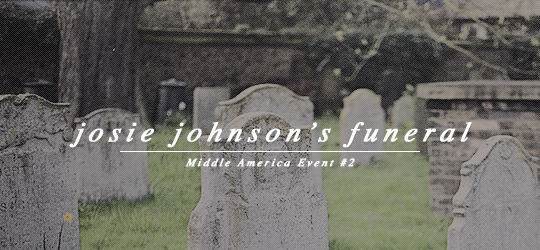
-- Event #2,
“Shitty day for a funeral,” Red Johnson remarks to his eldest daughter, looking out onto the glistening grass of the empty field across from Wade United Methodist Church. Church services for Josie have just ended. It’s been raining most of the morning; the clouds have cleared for now, but the sky remains an ominous shade of grey, like any second the clouds could part, and a flood would come down from the heavens. Part of Red wishes it would; to him, it would be apropos.
Of course, any day is a shitty day to bury your wife of forty-something years. Red can’t exactly remember how many years they were married; Josie was the memory between the two of them. Now, he’s got to remember things for himself… He’s lucky she’d been so meticulous about writing names, phone numbers, and addresses in her tiny little blue book, or he’d have had to put up posters to invite people to this goddamn travesty of an event. Part of him is still hoping no one will come. Then again, he knows very well Josie was well-adored in the town, and the majority of its residents will probably stop through to offer their condolences. Shouldn’t that be comforting? Maybe if she’d died of natural causes, but not with a murderer on the loose.
Next stop is Kane Funeral home. A bright white colonial with black shutters, and a red door. It’s picturesque, too well kept to be natural. It’s almost sad that some little family doesn’t call it home. No, it’s just another stop on the road of the dead-- the last one before they meet their final resting place. Josie’s body has sat, rotting as slowly as science can ensure, at the Allen County Coroner office for the last month after an extensive series of testing, podding, and poking. Every couple days they’d move her body from cold storage to the sterile, stainless steel examination table, and take another stab (quite literally) at figuring out exactly what happened to her. They’ve come up mostly empty-handed. At this point, no more information can come from Josie’s corpse, and if they do need it again, they can always exhume it. The Johnson family needs to lay her to rest.
It’s an open-casket event; after all, Josie’s body was in nearly perfect condition when it was found, save for the gash that was hiding on the back of her head. Her body has been dressed, her most precious jewelry put on, and healthy smattering of the strongest makeup known to man has been applied with a delicate hand. When the mortician left her, she looked peaceful. Hands crossed, eyes closed firmly… as if she was just sleeping. And she is sleeping. Eternally.
The casket is rolled carefully into the viewing room, and the flowers are arranged ahead of time. Josie’s body is left alone in the room for exactly forty-six minutes before the guests even begin to file in to say their final goodbyes to her.
Naturally, Red, and his two daughters are the first to enter the viewing room. People have already begun showing up, gathering in the lobby of the funeral home, and preparing themselves for a whirlwind of emotion.
No one expected this, though.
Red, tears already pouring down his face (so much for a stiff upper lip), makes his way to the casket, truly prepared to see his wife for the last time. But when he reaches his final destination, all he sees is white silk. An empty casket.
Shock sets in, and shock for Red Johnson means silence. He stumbles back slightly, towards his daughters, who are confused, immediately asking questions, almost afraid to go look for themselves. Red can only point to the casket, wondering if there’s been some type of mistake. They’re there at the right time, right? This is the right room, right? Where is she?
His eldest daughter musters up the courage to peek into the casket, and just as quickly as she's heading straight to find someone who can help them. Josie’s disappearing act part three. Jesus Christ. She pushes her way through the townspeople waiting in the lobby to get to the back office. Fred Kane, third generation funeral home director has seen some shit, but this? This is unbelievable. He’d been in that room exactly… fifty minutes ago now, and the body was just lying there just as it should have been.
“Is this some kind of sick joke, Kane?” Red has moved past shock, and has gone straight into anger… as per usual. But wouldn’t you be angry, too? How could something like this happen? Was it negligence? A cruel prank? Something else?
There is no surveillance equipment in the funeral home. Can you imagine if there were? Cameras in every room watching people grieve? That’s a sick joke in itself. There’s no way to know exactly where Josie’s body has gone. Kane doesn’t have any answers. The mortician (only a woman of thirty years, or so) doesn’t have any answers.
As per usual in Wade NO ONE has any answers. The waiting room just steps outside of the viewing room is slowly filling up with mourning Wadians, almost to the point where there’s no breathing room for anyone. Fred Kane has to come out of his office, and urge people to please wait outside on the lawn for the time being while last minute details are worked out.
Everyone can sense there’s something strange going on, even for Wade.
You, like everyone else, are now standing on the sprawling lawn of the Kane funeral home wondering what the hell is going on, and when you’re going to be able to go in, and say goodbye to Josie.
After about twenty minutes of chatter, Fred Kane is standing in the doorway of the funeral home, practically just a shadow. He speaks from his perch, “Everyone should go home.”
Leave it to Josie to have a fucked up funeral.
Event Prompts:
WE WANT ANSWERS: Characters may consider trying to enter into the funeral home to figure out what’s going on (perhaps once it’s gotten dark). As stated previously, the Kane Funeral Home is a converted home; there are other entrances/windows towards the back of the house that may be accessed. There’s no guarantee any characters will discover anything but it’s the hunt that counts! Just try not to get caught by any workers, or members of the Kane family.
The main blog may be able to interfere with threads of this nature. If you receive a message from the main blog regarding your thread, you will have to cease what you were doing, and abide by the main blog’s instructions.
This could include: simply being kicked out by the Kane family, the Wade Police Department becoming involved, allowing your characters to uncover a clue, etc.
Threads may continue after moderator intervention, but must keep in line with what the moderator has determined to happen.
No real punishment/harm will come to your character without your consent. This is just a fun way to make the game a little more interactive.
DRINKING OUR SORROWS AWAY: Some townspeople will choose wisely, and leave the Kane Funeral Home with their unanswered questions in tow. A good option for those still wearing black is to drown their sorrows at the Conifer Lounge. It’s Karaoke Saturday, and given the circumstances Fucking Hipster Bullshit has elected to begin the festivities early. Dollar drafts are also a thing. So go get drunk. Sing one for Josie.
MEET ME AT THE PARK: Other Wadians may ban together, and move their conversation over to the Wade Recreation Center. Even though it’s likely raining again (not to mention that it’s probably getting dark), some suspicious individuals may elect to converse about all of the oddities that have been taking place in Wade as of late at the park. Rumors of the Mayor’s Letter may spread during conversations that take place here. Henry Gregory may also be brought up. Citizens are encouraged to start thinking deeper. Sure, there’s a dead old lady to worry about, but is there something deeper happening, too?
Characters are not limited to these three prompts, and may do whatever they’d like in the advent of Josie’s funeral being cancelled (postponed?), these are simply suggestions to get the ball rolling.
Have fun, attempt to interact with those you have not, and happy writing! Threads for this event may commence immediately, and should be wrapped up in about five days (04/30).
Other threads should continue as normal, and all interactions do not need to revolve around the event at all!
7 notes
·
View notes
Text
The Last Light

There is a moment in David Lynch's Twin Peaks: The Return that on its incandescent surface could have been lifted, weightless, from the great post-war dream of materialist deliverance: The top on the convertible is down, the radio on; The Paris Sisters are singing I Love How You Love Me as a reincarnated Laura Palmer lifts her face to a cloudless sky. Within the tapestry of this early Phil Spector production — his trademark reverb eternally associated with Romance and Death (two conditions Spector knew all too well) — the voice of Priscilla Paris is a siren sound from the American Beyond. We could be hearing a dream goddess lullaby from the whispering gallery, or sweet nothings from the crypt. We don't know. We'll never know. Just as Quentin Tarantino’s Once Upon a Time... in Hollywood keeps us guessing with the elusive murmur that “Sharon Tate will never die,” granting her a gaudy, wondrous L.A. to cavort in where it's 1969 forever and movie stars still matter, so we find ourselves in Tarantino’s version of paradise (complete with flame throwers to the face). In this oneiric echo chamber, momentarily shared by Lynch and Tarantino, Surrealism smiles down upon a vision of American blondness; muscle cars soaked in sunlight; the terrible ecstasy of unending motion; candy for the eye and ear.
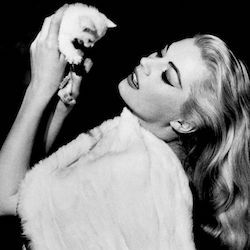
David Lynch’s favorite film, to this day, remains Otto e Mezzo, directed by Western Europe's sorcerer of confectionary delights, Federico Fellini; the man who put the “dolce” in La Dolce Vita. And here you have a fleeting taste of ideologies swirled together and spun like ribbon candy: a blur of four-wheeled luxury from the New World, zooming past regional splendor into that fraternity of man: the socio-economic nirvana imagined by Karl Marx.
Careening from one via to another at harrowing, white-knuckle speeds, Fellini was heard to lament that “Some of the neo-realists seem to think that they cannot make a film unless they have a man in old clothes in front of the camera.” George Bluestone, recording these words in 1957 for the pages of Film Culture, was sittings in the literal passenger seat of the ideal metaphor of post-war ebullience in action: that famous Black Chevy skirting the Italian Scylla (the Vatican) and its equally dogmatic Charybdis (the Party); expert, 20th century precision guiding them through Roman streets with graffiti-scrawled churches proudly bearing the hammer and sickle. At those velocities, anything could make sense.
“What for you is the greatest human quality?”, Bluestone asks. Fellini responds, “Love of one’s fellows,” a period-appropriate oath that rings true to his brand of ecumenical solidarity.
“The greatest fault?”
“Egoism.”
Try, if you will, to imagine our more locally sourced egoists nodding along with Fellini in soulful agreement on that one. As a kind of compatriot of Edgar Allan Poe, David Lynch (and, to some extent, Tarantino) spawns from his abiding axiom that “The death of a beautiful woman is, unquestionably, the most poetic topic in the world.” In Lynch’s hands, American television has become a brightly lit seance for Poe’s ethereal dead. Immortal creatures afflicted with the dream of physical existence, then afflicting the dreamers. Twin Peaks: The Return modifies Poe's axiomatic truth with great help from Amanda Seyfried's Becky and her pair of visionary's eyes, melting Spector's dark edifice of sugar in deathless, Sternbergian close-up — iridescent search lights, ever more urgently scanning the sky above for a sun to swallow her whole. We can only witness and internalize this shimmering ingenue trading places with Old Sol, as if the drugs she's consumed have entered our system and not hers.
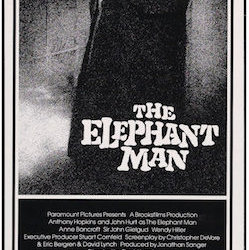
Filmmakers like Fellini and Lynch celebrate bodily extremes in intriguing, if differing ways that should naturally gallop right beyond the pale but nevertheless become wholly, weirdly digestible. It is perhaps the innocent glee, even wonderment, of these artists in the vast variety of shapes the human body can assume; innocence which acts as a giant eraser for every awareness on our part of how physical representation in the age of political correctness is meant to function. Lynch is able to present the disabled as by turns childlike, mysterious or magical beings without ever worrying about lending them agency (The Elephant Man's John Merrick is a passive whipping boy for seemingly the whole of Victorian London) or the lie of adult sophistication (the latest Twin Peaks iteration includes a pint-sized hitman who whines like a puppy when his icepick is broken).
Fellini's dwarfs and grotesques, on the other hand, emerge from the struggle of a one-time Marc'Aurelio cartoonist willing one-dimensional images into three-dimensional embodiment. His big women, of course, are fetish figures. They always were. Gargantuan beauties, evidence of a sexual ideal formed in infancy: the big Italian mammissima, seen from below. As Fellini grew into a rather large adult himself, this ideal was simply re-scaled accordingly (even the icy mountain of Anita Ekberg takes on new implication). Goddesses all, they are, however, not meant for conventional movie stardom.
And what of Tarantino? Once Upon a Time's Margot Robbie IS the no-longer-doomed Sharon Tate as she watches herself on the big screen; enjoying a thrill that few have ever known so guilelessly that any half-baked charges of narcissism shrivel to nullity before they can escape a single throat. Here before us is an essential glimpse into the vanishing phenomenon of movie stardom itself, reflexive handwringing from the woke balconies notwithstanding. Tarantino has at last achieved something transcendental: even his grotesques — slack-jawed, gap-toothed, gormless members of the Manson Family conflated with more contemporary Identitarian cultists on the lookout for 'Lookism', knives unsheathed — are downright mythic. Robbie's Tate is a visage both generically perfect and possessed by the angels, every one of them a blond resident of LA County, sincere and unknowable as desert light.
The vampires, creatures of night slain by sunlight, infiltrated the movie theaters in the 1920s and never left. They sit next to us in the dark, having ceded the power to hypnotize us to the glowing screen itself. Photochemical vagaries invariably allow movie darkness to behave in impossible ways; as if the physical properties of film itself knew no rules, and thus invited us to accept its essential anarchy without question. Before us is a darkness that GLOWS.
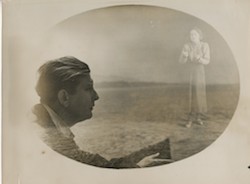
A Black & White image flipped into negative can produce black fire, or the black sunlight which illuminated the Transylvanian forests of Nosferatu, through which a box-like carriage rattles at Mack Sennett speed. But with only the smallest underexposure, a little dupey degradation of the print, or even a little imagination (such collaboration is not discouraged), this liquid blackness will spread anywhere, everywhere; the most luminous pestilence known to creation. Be it in the laughing nightmare of Fleischer cartoons of old (Out of the Inkwell, indeed) or Jean Epstein's photogenie phantasmagoria, we're left to wonder. Is daylight burning out the corner of a building, or is it the blackness of the building which is eating into the sky? As with so many such questions, film permits us no answer. We are to simply watch as characters smudge, their shadows emanating out beyond themselves, pulsing and flickering with an obsidian internal flame.
By the time Jean Epstein adapted The Fall of the House of Usher in 1928, it could wisely be said that Poe had been already aggrandized through the mechanism of carbon-arc projection; which is but one way to say that the vision that once seemed unharnessable, had at last been industrialized. Dragooned. Pressed into an ever more modern service at a pace to be measured in frames-per-second. Artists like Epstein and Chomon were the first generation to wield an immense cultural and commercial instrument; at once abidingly real and totally incomprehensible. No medium of expression predating cinema could so thoroughly lift audiences from linear time, or could as convincingly, in the words of Jean Epstein, render death as a conscious state.
Transcendentalism barely scratches the surface here. A more apposite term — the one he nuances in his film theory, “photogenie” (a genesis out of light) — pulls transitory moments, otherwise escaping human perception, into focus. If Poe engrosses us in Romantic conceptions of death as a means to visionary truth, Epstein reveals that same supposedly “elusive” end in our earthly world of telephones, sports cars, Kodak cameras for the every-man and moderne manicures for up-to-the-minute dandies.
The Victorians were falling away. And with them a system of reality contained in narrow, overwrought performances. Withered technique as a means of reflecting Nature — or, to quote Balzac, the “conjugation of objects with light” — was displaced, uncrowned by Jean Delville’s Death (1890), which embodies an altogether different kind of virtuosity, one no Academy could ever comprehend. The charcoal drawing and ode to Edgar Allan Poe’s Masque of the Red Death yearns with a combination of verve and starkness toward a capital “G” Gloom destined to escape salons.
Coming of age in a series of shady elsewheres — the fairgrounds, nickelodeon parlors and movie palaces of an Edwardian America — nitrate and its twinkling mineral essence gave Poe's crepuscular light its time to shine and thereby illuminate the world. No longer held in the solitary confinement of a page of reproduced text or an image, however still, rendered in paint or ink. Poe's singularly tormented vision was finally written alchemically, in cinematographic rays beamed through silver salts; into moving images of such aggressive vitality as to blast every rational thing from one's mind.

All hail magic mirrors! Celestial mandalas! Giant eggs and butterfly women! Segundo de Chomón's The Red Spectre (1907) ruthlessly invades our eyes with a wraith-magician dissolving through his coffin lid in a red, hand-tinted, flame-flickering hell. His caped, skull-masked presence was to herald the manic new thespic truth that, from this moment forward, the art of acting is in how you respond to light, and how light responds to you. The Specter of Chomon's dark bauble is in every element Poe's Red Death — japing and performing tricks for us, his adoring fans and welcome guests, before announcing our doom — literary metaphor slammed against a literal backdrop of amber stalactites, pellucid as an ossuary.
Doctor Pretorius might have been musing on the history of cinema in 1935’s The Bride of Frankenstein when he said: “Sometimes I have wondered whether life wouldn't be much more amusing if we were all devils, no nonsense about angels and being good.”
by Daniel Riccuito, Tom Sutpen and David Cairns
8 notes
·
View notes
Link
In advance of the upcoming release of Chicago by Night, please enjoy these story hooks from the upcoming Chicago Folios stretch goal:
V5 Chicago Folio illustration by Michael Gaydos
Dearest Club Member
We would be delighted to see you at the annual Evening of the Flesh this coming month. We, the Black Roses, will be arranging the meet-up this year, and can truly say, it will be even bigger, even better, and even more interesting than in years prior. We have special playtoys we cannot wait for you to get your hands on, and I am sure they will happily oblige your every desire. If not, we will make them — like we always do.
Per our code, this event must stay strictly confidential. We wouldn’t want any disturbances to ruin our night (no one could forget last year’s near slip-up). This year’s theme will be “The Blood”, so please dress accordingly — think of something that reminds you of what gives you life. Perhaps, a red dress? Maybe a burgundy tie? Even shoes count! As long as your appearance channels that which we all burn for.
The guests this year will be young, so please be on your best behavior. We don’t want to scare the poor things, at least not until reach the end of our little ordeal. After all, they are not used to the ways of our club. Still, they did not earn their blood, and make better meals than anything else.
Remember, you can always bring a plus one. But make sure this individual is ready for all the fun controversies we will be embarking on. Most importantly, they will have to keep quiet. We don’t want a certain royalty to hear about our games.
We look forward to seeing you,
The Black Roses
Exclusive Invitation
Cast: Annabelle (Chicago by Night, p. XX), Karyn Stanislava (p. XX), The Black Roses — a secret society within a secret society
What Happened:
Every year for the past decade, a group known as the Black Roses assembles in Chicago for a debauched party in which they enjoy every pleasure flesh and blood can give. Though many such parties take place across the States, the Black Roses’ events are a special kind of depravity, as the members of the secret group test each other’s Humanity and attempt to tease the Beast to the surface with every sinful act.
Though rumors of the Black Roses have extended beyond Chicago’s boundaries, few know the identities of vampires within the club. The Toreador Black Rose known as Karyn Stanislava is only known because she often organizes the more palatable entertainments and has to coordinate with other vampires to hire gifted retainers and Kindred-aware security. Karyn is sworn to silence on the matter of the remaining names on the guest list, and it’s possible she doesn’t even know them. The club insists its members wear masks and are forbidden from uses of their vampiric Disciplines (at least from using them on each other) when the Black Roses come together.
The group name implies a largely Toreador society, but Annabelle has voiced her displeasure with the vulgar club for its acceptance of diablerie. An invitation found from the last session discusses feeding from the young, which turned out to be thin-bloods imported into the city, one of whom escaped.
The Prince would like this group shut-down completely; while a secret society for now, the longer the festering debauchery remains contained, the worse the explosion when someone finally penetrates its shell.
What Could Happen:
• A member of the coterie receives an invitation to attend a party with the Black Roses and finds themselves in an exclusive soiree where no sins are off-limits. Thoughts fly to the debased practices of the Sabbat and the Church of Caine, and any vampire experiencing these “pleasures” runs the risk of falling to their Beast.
• Annabelle recruits the coterie to infiltrate the Black Roses’ next party, reasoning that if everyone remains masked, they should find doing so no trouble at all. The party is horrific in every way, compelling vampires with higher Humanity ratings to burn the whole thing down before leaving. During the party, it’s possible one of the members of the coterie might discover a known (and ostensibly humane) Kindred is one of the other guests. Keeping their identity a secret is enough to command a boon or gain a Contact, though that vampire might subsequently become an antagonist.
• One of the coterie’s thin-blooded associates disappears, with rumors abounding that the Black Roses are snatching up thin-bloods for party food. Annabelle tips the coterie off to Karyn Stanislava’s location, giving them the opportunity to get even or gain information.
Attribute Focus: Social
Karyn Stanislava
Clan: Toreador
Sire: Hathaway, “The Menshevik”
Embraced: 1930 (Born 1907)
Ambition: Make the Black Roses more impressive year after year
Convictions: Never let them know your true power
Touchstones: Arturo — loyal, long-time retainer
Humanity: 2
Generation: 9th
Blood Potency: 2
Attributes: Strength 2, Dexterity 2, Stamina 2; Charisma 4, Manipulation 4, Composure 2; Intelligence 2, Wits 4, Resolve 3
Secondary Attributes: Health 5, Willpower 5
Skills: Athletics 3, Melee 2, Stealth 1; Animal Ken 2, Etiquette 4, Insight 2, Intimidation 1, Performance 3, Persuasion (Seduction) 4, Subterfuge (Innocence) 5; Awareness 1, Finance (Investments) 3, Medicine 1, Politics 1
Disciplines: Auspex 2, Celerity 2, Obfuscate 1, Presence 2
Help for Hire — Warehouse Rebuild
Several able-bodied and robust younger people are needed for a complete rebuild of my warehouse in Lincoln Park. The warehouse was previously used to store auto-parts but has been empty since 2001. It is now needed for a new project, and therefore, I seek help to spark life into the old halls once again. The warehouse refurbishment needs to be ready in a very short span of time. In order to be a part of the project, you need to meet certain requirements:
• You will need to be available sixteen hours a day every day for two weeks. This may seem intense, but I need this job done as soon as possible. You will be paid very well for your time and effort. Therefore, I seek individuals who do not have immediate family to attend to and are currently unemployed.
• You will need to be between the ages of 18 and 40.
• You will need to be in a physically good condition to perform the job. My only requirement is you are not currently sick.
• You cannot bring any cellular devices or means of communication. This is simply because I need your full attention while you are here, and I do not tolerate sloppiness or distractions.
These requirements must be met for you to seek this position. In return you will get:
• Full housing and accommodations during your two weeks. A trailer with everything you need, including kitchen and bath will be available to you.
• $50/hour + an additional $10/hour during night and weekend shifts.
• A starting bonus of $1,000 with a signed work contract.
If this catches your interest, please contact me on the enclosed cellphone number or send a letter to my PO Box. My personal assistant will be answering your calls during daytime since I am often busy or out of the office. I will be available for brief questions or any other inquiries typically from 9 PM – 11 PM, as I will be in office.
Kind Regards,
Amelia Locke
Seeking Employment
Cast: Amelia Locke (p. XX)
What Happened:
It’s a simple enough sounding ambition: Amelia Locke, childe of Joseph Peterson, wants to create a new Elysium.
She has the property, which was an old warehouse near Lincoln Park gifted to her by her exiled sire. Now, she just needs to figure out what to turn it into. Her lover, Tatyana, suggested a club, but there are already plenty of those in the city. She’s reached out to Annabelle and Kathy Glens, who suggested a gallery or an auditorium, respectively, but neither prospect appeals.
This vampire journalist is hard-nosed but willing to listen to ideas. All she needs is a good one. Something that might leave a new mark on the Chicago map. It’s the kind of enterprise any aspiring Camarilla vampire might get behind.
What Could Happen:
• The coterie provides Amelia with financial backing for whichever venture she decides to undertake. Doing so earns them Amelia as a one-dot Mawla, but the investment takes a long time to yield results as the Ventrue’s many advisors suggest everything from a theatre to a board game café.
• The coterie attempts to directly influence Amelia’s decision, living their fantasies through her. Unless they’re subtle, she rebukes any attempts at control and becomes a one-dot Adversary for each member of the coterie. She’s not interested in being someone’s puppet. If they are subtle, they may convince her to invest in a business that matches their interests.
• The one idea Amelia hasn’t considered but would gain the backing of the Hellenes and the Tremere of the city, is a new city library. It would appeal to her journalistic desires, and if other vampires get their way, could even provide a secret study and reading room for Kindred texts. It wouldn’t make a massive splash on the social scene but would provide a place of quiet contemplation for vampires of the city.
Attribute Focus: Mental / Social
3 notes
·
View notes
Photo
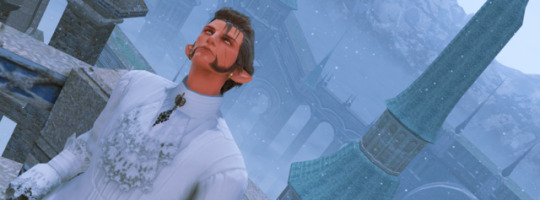
LF RP — Rosemund Blackthorne
Rosemund Blackthorne, born Rosemund de Valieroix, is an Ishgardian Elezen of 34 summers. The head of a house regarded as low nobility, Rosemund quickly plunged his house into debt. Rumors circulated about the family after Rosemund's father was tried for heresy by being thrown from Witchdrop, and in an effort to maintain the House Valieroix's outward social status, he tried to appeal to his peers with lavish gifts, which of course they accepted without giving him what he sought in return.
While the House's good name was cleared along with his father's post-mortem, Rosemund's faith in the church never recovered. Resolving that he could not stand by and watch a broken system prosper, Rosemund took up the sword of the Dark Knight in secret. Since then, he's wielded it to defend those who have no means to defend themselves—namely once-accused heretics and those of low social status, who despite Ishgard's various reforms, still face no shortage of discrimination from above.
IN CHARACTER
Profession(s): Lesser Noble—As Rosemund is a lesser noble, head of House Valieroix (an honestly, quite pathetically small house that pledges its allegiance to the Haillenarte), he doesn’t really need to work. But he might be able to find a job for you, even if money is tight right now. Dark Knight—Fashioning himself a defender of the persecuted, he pays special attention to those accused of heresy. Now that the truth behind the Dragonsong War has been revealed, he does not believe that heretics deserve to suffer any more than they already have within Ishgard’s walls.
Alignment: Chaotic Good. Loyal to the Eorzean Alliance. Dubiously loyal to the Holy See.
Professional Talents: Nobility—Rosemund’s upbringing afforded him many luxuries that others may not have been able to afford, such as schooling via a tutor. He also was trained in swordplay (including fencing) and chocobo-riding. But now, he uses a Zweihander exclusively.
Current Residence: Private manor in The Pillars.
Likely Haunts: Ishgard and Coerthas—The Pillars, especially the Jeweled Crozier. Avoids the cathedral. Tailfeather—A man of surprisingly simple pleasures, Rosemund occasionally retreats to Tailfeather for “time to think” and has considered packing up and moving out there more than once. Eorzea at large—He doesn’t have many obligations and the continuing failure of the Blackthorne house after his father’s untimely death is something he can only barely bare to face. Have Zweihander and some okayish wine, will travel.
Hobbies: Wine sommelier, or so he claims. He’ll drink anything, but has a deep appreciation for fine wines, especially Ishgardian vintages. Botany—He honestly kind of has a black thumb and can barely take care of house plants, but he likes to keep them around and occasionally presses leaves and flowers to affix in journals later.
MORE INFORMATION: Full Bio WIP | Tag
OUT OF CHARACTER
Hi there! I’m Crow/Mid and I use they/them pronouns! I’m generally most active during NA Evenings and Late Nights. I play on Balmung, but I’m open to RP connections from across the Crystal datacenter.
You can find detailed information about my hopes and expectations for RP on my dossier, here. The quick and dirty version:
OOC Communication > All
I am a med/heavy lore-strict RPer. I prefer medium-to-low power levels in RP and character- and plot-driven scenes. I won’t RP with any player under the age of 18 but as long as you’re not making it weird/creepy, I don’t have a problem with underage characters.
I run an FC and an LS, so I can be pretty busy OOC because I have to run a lot of stuff related to that.
I do not RP on Discord, but I have always been smitten with Tumblr RP as a longform format, so if in-game RP is impossible for some reason, I’m happy to write starters.
In terms of things I’m looking for:
Casual acquaintances and friends!
Enemies, especially Temple Knights (since being a Dark Knight is probably not the most law-abiding profession...)
Ishgardians!! I love me a good political story, and the ins and outs of high society in Ishgard is <chef’s kiss>
Long-term plot-focused RP connections!
Recommendations for events to attend? (And company to drag me along since I hate flying solo.)
Discord and Linkshell communities!
DETAILED RP HOOKS UNDER THE CUT!
Thanks for reading! If you’re interested in playing with me then please feel free to send me a message or make a note of it in the tags or comments on this post. My Discord is available for OOC arrangements and chatter upon request! If I’m slow please bear with me; I have a habit of getting absolutely swamped with stuff at more or less complete random, and my energy levels vary wildly from day to day and week to week.
tagging for visibility: @balmungrp @mooglemeet @ffxiv-crystal-rp @crystalxivrp @ffxiv-balmung-rp
RP HOOKS
1. House Valieroix
Rosemund refuses to use his surname, instead keeping the epithet Blackthorne from while his house was under suspicions of heresy. Many regard this as a symbolic gesture, but others regard it as silly and perhaps even a little immature. It’s difficult for a conversation about Rosemund to happen in any social circle without bringing up this quirk of his, though thus far his peers prefer to watch the rumor mill turn than ask him about it to his face. To be fair, if he were to dispel the mystery, that would probably be a lot less fun.
House Valieroix was never a terribly important house, though it aligned itself with House Haillenarte for political purposes, and generally did not get along well with associates of House Dzemael. Rosemund has speculated for a while that the “zealots” or more conservative members or associates of House Dzemael may have been behind his father’s charges of heresy, but he has no evidence to back up this claim.
House Valieroix is also in deep debt because of Rosemund’s poor financial skills, and it’s likely that they will be bankrupted soon without intervention.
2. Chocobos
While not the biggest fan of chocobos there ever was, House Valieroix owned a few prized birds that Rosemund loved dearly when he was younger. Unfortunately, in recent years he’s had to sell off a number of the house’s possessions in order to pay down debts and hold onto properties that have been in the family for generations. Including the birds. The decision broke his heart and he misses them dearly.
In general, Rosemund is also a fan of chocobos. He just thinks they’re neat. And before the eternal winter fell over Coerthas, he’d occasionally play polo with his cousins and family friends in the Coerthan lowlands.
3. The Road to Hell
As a Dark Knight, Rosemund takes it upon himself to protect those who lack the means to protect themselves—including accused heretics. While the end of the Dragonsong War and the revelation of the truth behind it effectively decriminalized heresy, that didn’t stop those accused from suffering social consequences, or from the powerful coming up with new reasons to persecute the accused...
In general, despite decidedly lacking the funds to do so, Rosemund is at his core a charitable soul, and occasionally takes in those who have no place to spend the night, especially during the winter moons. Those who have stayed the night generally leave with shining reviews of his hospitality and willingness to accommodate, though also note that many of the less-often rooms in the manor are caked with a visible layer of dust and remark that the food “needs work.”
#balmung rp#crystal rp#ffxiv crystal rp#crystal ffxiv#ffxiv rp#ffxiv balmung#final fantasy xiv#ffxiv#hellsbovnd#ooc ( lfrp )#about ( rosemund blackthorne )#[ I'm so powerful. I cannot be stopped. ]#[ Crystal gave me so much alt-making power you guys. Doubly so because Balmung reopened. ]#[ q: is there even one of my characters that does not have trauma? a: no ]
43 notes
·
View notes
Note
Could you make a one shot/short story that’s sort of a prequel to Gloriana? Like how killian and Emma became close and what happened that night at Hatfield house?
Gloriana - my Tudor Court AU with Emma as Elizabeth I and Killian as a mix of Robert Dudley and Francis Drake - was one of those fics that I did intend to continue but time just got away from me, and it did work as a one shot so I left it as it was. But I had started writing a second part forever ago and when I got this message I pulled up the file, reread it and my inner history nerd came out again and….
….7,000 words later, here is Part 2. I always envisioned this as a non-linear story anyway, so there’s two flashback scenes plus a scene that takes place after the events of part 1 and I’ve included the night at Hatfield referenced in this line, “She hadn’t been a virgin since that night at Hatfield House lo those many years ago, when Killian had taken her to his bed and made her a woman in his arms, ruining her for any other man from that day forward.”
(so yeah, it’s rated M - hope you like it, Nonnie!)Part 1 is here on Tumblr and the fic is posted on ff.net hereGloriana - Part 2Hampton Court PalaceSome Time Ago
“I do not believe we have been properly introduced, my lord.”
“We have not, but I’m afraid I must correct you, Your Highness, as I am not a lord.”
“And I must correct you, good sir, as I am simply Lady Emma and in my sister’s court it is a foolish mistake to call me Highness.”
The tall man with bright blue eyes that reminded Emma of the sea leaned down slightly in a graceful hint of a bow and lowered his voice so that it carried only to her ears, “I assure you I am no fool, Your Highness. My name is Killian Jones, and I have come to court to swear my service solely to the Princess Emma, lawful daughter of the great King David and true heiress to the throne of England.”
Across the room Philip of Spain bowed somewhat stiffly to Emma’s half sister Mary, daughter of her late father David and his first wife, the repudiated Kathryn. The whole of the court was there to celebrate their marriage, including Emma, the rather inconvenient heiress presumptive who Mary could hardly bear the sight of at times but couldn’t quite ignore completely. The courtiers tended to follow their queen’s lead and few were brave enough to be seen conversing openly with Mary Blanchard’s daughter. Queen Mary’s memory was long and her hatred of the dark haired siren of a woman who had drawn her father away from Kathryn had never abated over the years, frequently spilling over to the only child of the passionate union between king and commoner.
“Watch your tongue, Master Jones. You very nearly speak of treason,” Emma warned in a hiss, back straight and gaze darting from side to side to reassure herself that no one had overheard. She might have been standing alone amid the wedding revels before the stranger approached her, but she was not so foolish as to believe that she was unseen. Spies were rife at the English court, as Spain, France and Scotland all vied for European supremacy and England was the board on which the pieces moved. Bishops, knights, kings, and a little white pawn with faint hope of being queened.
The man smiled, clearly unconcerned. “I merely speak the truth. Spain might be England’s bedfellow for a time, but planting seeds in a fallow field is no guarantee of a fruitful harvest.”
Emma was faintly shocked by his daring, both for speaking to her at all and for the rather crude reference to her sister’s marriage bed. But there was no denying that Mary was of an age where the prospect of children was far from assured, even with a virile younger husband like Philip and every restored Catholic priest in England praying desperately for their very devout queen to get with child. The petty, spiteful part of Emma had chosen to dress in a manner that flattered her own youth and bore the unmistakable hallmarks of her split bloodline for the festivities, golden hair inherited from her father just peeking out from under the curved velvet band of her French hood, whilst Mary’s graying locks were concealed completely in an attempt to camouflage the age difference between her and Philip. The queen’s gown was splendid, sewn all over with gems, slashed and puffed as a peacock, and in contrast Emma’s unfashionably plain dress was as spare and demure as a nun’s habit save for the wide Blanchard sleeves that unfolded so prettily and touched the floor when she’d curtsied to her frowning sister and new, speculative-eyed brother before retiring to her place in the shadows to watch and wait by herself for the tides to turn.
Only now she no longer waited alone.
She glanced at the man who stood boldly at her side while the rest of the court spurned her, a handsome figure in his black doublet, dark-haired, sharp jawed and an even sharper wit that was not unwelcome as he made several more cutting remarks towards the Spanish delegation. Emma was used to her solitude, it was as familiar as a lover to her, and she’d survived this long on her own, but she wondered with a sudden burst of wistfulness if she would ever be allowed to wed. Not so long as the queen remained childless, Emma knew, her claim on her sister’s throne was dangerous enough as it was, let alone if she bore a son before Mary did. Besides, marriage was a shackle that would bind her to the whims of a man as England was now bound to serve Spanish interests and her mother had been bound to her father until his professed True Love turned to something so dark and ugly in the end.
“I’ve vexed you.”
Killian Jones’s handsome smile turned to a frown as his eyes searched her face and his obvious concern pierced her disquiet. Her unringed hand found his sleeve, uncaring who saw the Lady Emma conversing so closely with a man of unknown loyalties, a Scottish spy sent to court by Cora de Guise perhaps, or a Protestant rebel looking to roust the Spanish delegation from English soil. She had the sense that he was neither, seeking not her secrets to sell nor a figurehead for his cause, and his offer to join her service was intriguing. If….when…the time came that the crown should need a new brow upon which to rest, she would need able men to help hold it steady, as a woman without a husband to wear it for her.
“No, milord, you have not.”
“Not a lord,” he reminded her with a saucy wink that made her colour as no nobleman ever had, “As you are not a queen, my Lady Emma.”
His lips just brushed the shell of her ear, whiskered cheek touching hers for the briefest of moments and Emma felt a flutter low in her belly under the stomacher of her gown at both the heat from his body and the promise in the single word he spoke.
“Yet.”
.
.
Several Years Later
“Your Majesty?”
Queen Emma didn’t turn around, standing at the window of the small audience chamber and looking down into the courtyard below. Ladies walked arm-in-arm in their bright gowns, followed by more soberly clad servants who carried shawls and baskets of necessities. Courtiers stood in small groups, their swords at their hips and their heads bent close in discussion. There was a clear divide, between the old guard of Catholic families who still retained a few drops of royal Plantagenet blood despite her father and her grandfather’s best efforts to stamp it out, and those risen to new estates and titles as rewards for supporting the young Nolan dynasty and its even younger Church.
She had such a reward to grant now to one who had always supported her since the day they met.
“Your Majesty we really must discuss this further.”
“There is nothing to discuss,” she replied in a crisp voice, tapping a long oval nail against one of the diamond-shaped window panes, “I shall make the formal announcement tonight.”
“But….Lord High Admiral? You are really going to appoint Captain Jones to such an exalted position?”
“After the success of his voyage he has more than proved himself able to hold the post.”
“No commoner has ever been named-“
“Which is why,” she interrupted, “I will also be conferring upon him the title of Earl of Misthaven.”
Silence reigned for a long moment before Sir Archibald Hopper, Secretary of State and longtime advisor to the queen, let out a heavy sigh at the news and reached up to pinch the bridge of his nose. “The Spanish Ambassador will not be pleased by that.”
Emma smiled, idly tracing patterns on the glass that bore more than a passing resemblance to the letters K and E. “Nothing pleases the Spanish Ambassador, and nothing ever will so long as I remain so inconveniently alive and in his master’s way. Ever since I refused Philip’s generous marriage proposal when my sister had scarcely grown cold in her tomb and denied him a second chance at England’s throne I have suffered much Spanish displeasure. You’d think the presence of his new French bride at his court would console him more, they do say Aurora de Valois is quite the beauty.”
“It won’t only be Spain, there are members of the council who will also object to this appointment. The Duke of Norfolk has been angling for his own candidate for several months now.”
She turned at that and arched a scornful brow, “While he corresponds behind my back with the Queen of Scots. His Grace is angling for much more than another royal appointment for his household, he is seeking a crown. But when he finally proposes marriage to Regina Stuart without my permission then he will either cool his heels in the Tower or join her in Edinburgh as an outlaw while I take his lands and title as forfeit. He can marry her as plain Robert Locksley and try to rule the Scottish chieftains if he is so inclined, but he will keep his greedy hands off my scepter.”
Her voice rose in anger and a lesser man would have backed down in the face of her obvious displeasure, but Hopper, her Conscience, as she called him, was made of sterner stuff and looked his queen right in the eye. “They say that Captain Jones also has his eyes on a crown, Your Majesty. You can name him Lord High Admiral and raise him to the peerage if you wish, but you must know that you can not marry a man of common birth.”
“Why is everyone in England so obsessed with the notion of marriage?” she snapped, two spots of colour appearing high in her pale cheeks, “I have no intention of marrying Captain Jones, Lord Hopper, nor any man, be he prince or peasant.”
“You can’t continue to hold all of Europe at bay without a husband and an heir to succeed you,” Hopper explained patiently, and not for the first time, “You have your choice of any unmarried noble from your court or the younger sons of all the royal houses, France, Sweden, Savoy, but eventually you must choose.”
The queen swept from the window, worrying at the gold coronation ring on her finger. “Have the letters patent drawn up. Killian Jones will be named Earl of Misthaven and Lord High Admiral of the English fleet. I trust you can handle any objections from the Council, and perhaps lay aside some smelling salts for when the news reaches the Spanish Ambassador.”
“Who is Killian Jones to you, Your Majesty?”
Hopper’s voice stopped her before she reached the door. The royal back went straight and silence reigned again for so long that he was sure she wasn’t going to answer. But at last she looked over her shoulder and regarded him where he sat on a low stool. Few were afforded the great privilege of sitting while the queen stood, only Hopper, Mistress Ruby Lucas, and one other who only ever exercised that right in private, never in public.
“He was a friend at a time when I had precious few and each was more valuable to me than any jewel. For his continued loyalty he has earned his reward, as I reward all who serve me and only me, yourself included, Sir Archibald. My family name is Nolan, for once we had had no land of our own and only the slimmest of claims to the throne. But now I am queen and I am England, and England has many enemies, some of whom dwell in this very court like snakes hiding in the grass. I need men like Captain Jones at my side to help flush them out and keep them from striking.”
The queen left Sir Archibald Hopper alone in the empty room, where he shook his head sadly and murmured to himself, “Killian Jones may walk behind you and sun himself in your glory, Emma Nolan, but he can never truly stand at your side.”
In a court where gossip was a currency more valued than coin the news surprisingly did not leak in the hours between the meeting of the Privy Council and the start of the banquet, another celebration thrown by the queen in honour of Captain Jones and the success of his voyage. The privateer was dressed all in black as was his custom and the queen had opted to don a new gown of white silk embroidered with thousands of pearls. Ropes of them also hung about her slender neck and fell from her ears, and it did not escape notice among the assembly that she had chosen to adorn herself so lavishly with gems from the sea. They all watched as she made her entry into the hall, framed between the carved oak doors that stood fifteen feet high on either side of her. Skirts rustled as the ladies curtsied to their queen, dipping down low when she passed with eyes demurely lowered to the floor. Emma walked straight to Killian, seeing nothing but him, the rest of the court was nothing but a smudge on the glass, unimportant and beneath her notice. Sir Archibald was her Conscience, her guide through the tricky and treacherous world of ambitious men and duplicitous women that she ruled, Mistress Ruby Lucas was Chief Lady of the Bedchamber, keeper of her deepest, darkest secrets and immune to any form of bribery or threats, while Killian Jones was bestowed with a secret title, one spoken only in stolen moments and known to only the two of them.
He was Emma’s Heart.
Not the queen’s.
Emma’s.
The sword at his hip was ornamental, a blunted blade beneath a silver guard and a pommel shaped like the neck of a swan, curved to fit his hand and adorned with emerald eyes that matched the gems in the necklace he had gifted her (and had, in fact, been chipped from one of the stones). A gasp went through the crowd when the queen unsheathed it with her own hand, reaching around his waist to do so in a gesture of breathtaking intimacy between Sovereign and subject. The Duke of Norfolk let out a strangled noise in the back of his throat while the Spanish Ambassador swore violently in his head, both realizing what was about to happen a minute too late.
“Captain Killian Jones, I confer upon thou as our most able subject for the post, the office of Lord High Admiral of the English fleet, to protect and defend the realm from those who would seek to do us and our kingdom such grievous harm.”
Killian had knelt obediently at Emma’s feet when she drew his sword, face betraying none of the smug satisfaction he felt. He’d known she would grant him this after the great success of his voyage, making the bitter years of separation sweet at last with his victory over all who’d sneered at his common name and scorned his prowess on the sea. No one would protect England as he would, for Emma was England personified, and he would protect her and defend her, until his dying breath. But her next proclamation caught even him off guard.
“I also name thee Earl of Misthaven.”
The flat of the blade lifted from his shoulder and caught the candlelight, flashing bright and seeming to ripple along the metal like a stone dropped in a still pool. So too did a ripple run through the crowd, as the implications of their queen’s decree sank in just as quickly. Emma Nolan had raised a commoner to the peerage, a dark-haired, French-educated commoner who groped for her free hand and kissed the back of it, head bent reverently over her slim wrist. David Nolan had done the same for Mary Blanchard once upon a time, the dark-haired, French-educated commoner he had loved so ardently.
And everyone knew how that story had ended.
“My Queen.”
The new earl looked up at his queen, seeing a smile playing at the edge of her vermillion lips. The memory tugged at the back of his mind, of another night, in another court, where he’d first paid his homage to a bastard daughter with barely a farthing to his name as a marriage was celebrated around them. Now she was the Sovereign, her inheritance firmly secured by nothing but her own skill and cunning, and he was a nobleman, one of the wealthiest in the entire country thanks to her royal patronage.
“My Lord.”
Emma swept back a lock of black hair from his forehead with a lingering touch, her expression tender and unguarded as she looked down at him and the court watched with bated breath. The Spanish Ambassador would write in his next dispatch that the English Queen “is clearly following in the footsteps of her father with the commoner Jones, now Earl of Misthaven, her close companion since his return from sea, and allows him to take unprecedented liberties with her person while he makes love openly to the queen with his increasingly lavish gifts and insincere flattery and is even said to be planning a marriage proposal” while Regina of Scotland sent a coded letter to the Duke of Norfolk upon hearing the news in Edinburgh and asked “Dearest Robin” if it was really true that “the illegitimate Blanchard bitch traded yearning looks and doey eyes with Captain Whoreson, a perfectly matched pair in their pretentions, as the self-styled Saviour of England has exalted a man of no name or family out from under her skirts” but no one openly challenged the queen’s decree and they all gave way to the couple when the earl rose to his feet and led the queen to the raised dais at the end of the hall where she gave the order to begin the feast.
“Will you come to me again tonight?”
His blue eyes were dark and imploring, the sea upon which she’d gladly drown. Emma rubbed a finger over one of the pearls sewn onto her skirt and gave an imperceptible shake of her head, speaking behind her goblet of wine.
“It’s too risky. The eyes of the entire court turn to you tonight, Lord Misthaven, and there is not shadow enough at Whitehall now to shield us from their scrutiny. Though you would not lack for feminine companionship in your chambers if you so wish it.”
“I wish only for you.”
The ladies of the court held no allure, and though he was a man of healthy appetites and knew he could easily charm his way into almost any bed he wished with his dashing countenance and new title, the Earl of Misthaven had his sights set on one only.
“Spain is watching us, as is Scotland through Norfolk’s eyes,” the queen cautioned, her own gaze finding the sour-faced ambassador and her scowling cousin Robert Locksley across the room. No one was close enough to overhear, but both men had other ears planted in the queen’s household, listening intently for any hint of scandal, and the most scandalous thing about the unmarried queen was her close relationship with her new, equally unmarried Lord High Admiral.
“If there is not shadow enough at Whitehall, my ship is docked at Portsmouth, and we could be there by the morrow on a fast steed. Say the word, Emma.”
A look passed between them that did not go unnoticed, a memory shared not by queen and earl, but by the woman under the silk gown and the man behind the moniker.
“It’s too late for that now, Killian.”
The pearl came free from the silver thread and was pressed into his palm in lieu of what she could not grant him tonight, her fingers closing his around it and lingering for a brief moment before the queen abruptly stood and everyone around who was seated scrambled madly to their feet. Mistress Ruby Lucas remained where she was in her chair, exercising the privilege granted to her by her royal charge until the queen passed the gaping courtiers and she finally rose to fall in step behind her, her scarlet gown like a trail of blood following the pristine white. In public Captain Jones always stood when the queen did, and he shifted his weight to one foot and rested a hand on the hilt of his sword with the pearl clutched tight in the other as he watched her walk away from him and his offer for the second time in his life.
“Congratulations, my lord Misthaven.”
He accepted Sir Archibald Hopper’s loud acknowledgement of his new status with a stiff nod, while several nobleman traded black looks and low conversations arose up and down the hall as alliances shifted like the sands to accommodate this latest development. He expected several to darken his door over the next few days with their proposals, to place younger sons in his service and even perhaps to attempt to arrange a marriage and see a daughter or a niece made a new countess at his side.
“Her Majesty was adamant that there was no one else who could fulfill the role and that any dissenting opinion would not be tolerated.”
That mollified Killian slightly and he flashed a smile that sent several of the young and not so young ladies standing nearby into a blushing tizzy. “I’m a hell of a captain.”
Hopper’s face was placid and his tone was light, but there was no mistaking the warning when he spoke to the man his queen had chosen if not as consort, then as something as unprecedented as her own unlikeliest of ascensions.
“Good. Because the storm is brewing on the horizon, and when it hits, all of England will feel the consequences of these decisions. Especially the queen.”
Emma had made her choice long ago, on a night when her path forked and a vow was sworn in blood. It had stained the sheets between them, the spilled drops a dark crimson circle on the pale linens like the red petals that ringed the white of the Nolan rose. The emblem of the royal house to which she would always truly belong to more than any man was inescapable, even during those few, secret hours when she was oh so fleetingly his.
He answered the Secretary of State not in the manner of a courtier, elegant and refined and as flexible as the wind, ready to twist and turn and follow whichever way it was blowing. Earl of Misthaven and Lord High Admiral of the English fleet he might be, Killian Jones was, at heart, a cunning pirate who’d sailed through his share of storms even before he was the queen’s privateer and it was that man who replied as he would on the docks, with a dip of his chin and a single, clipped, “Aye.”
.
HertfordshireLast Months of Queen Mary’s Reign
The lone rider urged his large black horse to a gallop along the winding roads and lush green fields of the countryside far from the capital, cloak flying out behind him and hat pulled down low on his head, raising a great cloud of dust beneath the sharp hooves that pounded unrelentlessly mile after mile as his own heart pounded madly against his ribs.
Not from the exertion of the strenuous ride.
From fear.
His gloved hands were cramped tight around the reins and only loosened a fraction when the squat rise of Hatfield House finally came into view, the low sloping roof stark against the rapidly setting sun that plucked fire from the red brick and leaded windows of the large country estate. In London the heretics burned at Smithfield and the sky above the city was black with the smoke for days on end, it drifted as far south as the docks at Portsmouth and carried the ash of the condemned souls away on the wind while the ships in the harbour still limply flew both English and Spanish flags in honour of the disastrous marriage pact between their half-Spanish queen and Spain’s king.
Captain Killian Jones served neither queen nor king, having sworn himself to another whose swan badge he wore in secret, close to his heart. He alighted from the saddle and left his lathered horse in the care of a white-faced groom before entering the house, scarcely stopping to knock the dust from his boots in his haste. Mistress Ruby Lucas met him inside the Great Hall as if she’d been expecting him, answering his half-entreaty, half-command of, “I need to speak with Her Highness. Now.” with a thin-lipped nod, not questioning the reason for such urgency.
“This way, Captain.”
There was hardly a servant to be seen about in the corridors or in the rooms glimpsed through open doors as Killian followed Mistress Lucas deeper into the house where Princess Emma had spent much of her uncertain childhood and remained her principal and favoured residence after the deaths of both her father and brother, an inheritance that went unchallenged by her sister to keep her away from London. Normally bustling with activity as the quasi-royal household of the heiress to the throne and shadow court to Mary’s, Hatfield House was strangely shuttered and still now, quiet as a tomb with only the faint retort of his own footfalls echoing along the long gallery. There were no squires cooling their heels and waiting for an audience, no messengers taking a mouthful of wine after delivering a letter, and Killian thought scornfully of rats deserting a sinking ship, as news must have spread that the Lady Emma had lost what little remained of her sister’s favour and the hangers-on had all fled lest they go down with her as well.
But not Killian Jones. He had made straight for Hatfield when his own man had sent the word.
It was at Hatfield where Emma had personally supplied Killian with the funds that went straight to his small ship, allowing him to purchase the foodstuffs needed for longer, more profitable journeys than he was currently able to undertake and speculate on cargos with no ready buyers to front the cost. It was at Hatfield where he’d brought her back the fruits of his voyages, spools of Brussels lace and costly Venetian glass, watching her face light up at both the gifts and at his safe return from sea and telling her tales by the fire of the lands he had visited as the wine flowed and the hours slipped by without notice or care.
It was at Hatfield where he had fallen hopelessly, utterly, wholeheartedly, in love with the girl who should be queen.
Mistress Lucas ushered him into a chamber and she was seated in a chair by the window, sitting straight-backed and staring at nothing. He hair was loose, a spill of gold down her back with no modest hood to conceal it, while she was garbed in a robe that was hardly suitable for receiving an unrelated man, though it was heavy and fur-trimmed against the chill it was low-necked and revealed the white swell of her bosom and the slim column of her throat, slender and delicate, as her mother’s was said to have been. Her former governess withdrew with a curtsey and closed the door behind her when she left, soft click of the latch loud in the silent room and leaving them alone without so much as the pretense of a chaperone to guard against wagging tongues and whispered allegations. Killian supposed it no longer mattered, not now, not when the worst accusation of them all was about to be levied against the Lady Emma’s Grace.
He spoke without preamble, “My spies have informed me that the queen signed a secret warrant for your arrest, on charges of high treason. They will be here no later than tomorrow afternoon to escort you back to London.”
There wasn’t so much as a flicker of emotion in response to his announcement, no gasp of alarm or draining of colour from her cheeks. There was only the barest arch of a brow as her gemstone-green gaze finally flicked to his.
“You have spies in my sister’s household, Killian?”
“Aye,” he answered, bothering to speak like a courtier as he moved to kneel in front of her and took her unresisting hand in his, rubbing his thumb over the rapidly fluttering pulse on the inside of his wrist. His informants had been well paid and it had been worth every penny to be kept apprised of the state of affairs at court, where Emma’s sister had failed to conceive a child and Philip had left his wife behind to wallow in her failure while he returned to his father’s empire and refused to come back to England. There would be no heir of Mary’s body born to succeed her, but she was loathe to let the daughter of her greatest enemy take her crown.
“My ship is docked at Portsmouth, we could be there by the morrow on a fast steed. My own is too spent from the journey, I’ll have the groom saddle a fresh mount from your stable whilst you don your plainest riding habit. The Dutch will surely offer you sanctuary inside their borders, or we could make for the Low Countries or-”
“I’m not leaving England.”
He reeled back as if she had slapped him, “What? Your Highness, please, if you don’t come with me tonight then they’ll take you to the Tower, and there will be no chance of rescuing you once you are secured behind those walls.”
She trembled and gave a heavy swallow at the mere thought of the ancient stronghold, but Emma did not waver in her conviction. “If I flee with you now, the moment I set foot off English soil my guilt will be confirmed in the eyes of the entire country. I will be convicted without fair trial, be branded traitor to the crown, and so will you.”
His face was a twisted mass of thunderclouds and storm, raging with the force of his emotions and the hand on hers tightened almost painfully. “Damn me for a traitor then, for I’ll not serve any crown or any prince save you and would rather sail lawlessly under the crimson flag for the rest of my days so long as you were kept safe from your enemies. For God’s sake, Emma, fair trial or not, you could still be executed for this, as your mother was before you.”
No one spoke the name Mary Blanchard at Hatfield, though her presence was the unseen ghost behind every fluttering curtain when there was no breeze and the shadow from every candle that flickered and danced so merrily before snuffing out. Once upon a time a king had loved a commoner he could not have, loved her beyond all reason and sense, a love so deep that it had nearly rent England right in two. Emma Nolan was her father’s daughter with her golden hair, but ambitious Blanchard blood ran through her veins, blood that had been spilled to see a daughter set upon a throne where no woman had ever sat before.
Killian begged and pled, “Don’t do this, Emma, please!” but she would not be moved. It was her destiny, set in motion long before she had even been born. It was a curse, inescapable, that had swept across the land and only she could break it.
There were tears on his face in the amber light from the fire, wet rivulets that carved tracks down his cheeks and she tasted the salt when she leaned forward and pressed her lips to his. The kiss was a brand, a promise, a whisper of words she could not speak. Emma rose from her chair and let the robe fall from her shoulders to reveal the white silk chemise that she wore underneath, pure and unblemished, a thin, unsubstantial thing without corset or farthingale to shape and sculpt her form into that of a king’s daughter. Killian Jones sat dazed on the floor while she stood, too stunned by the sight of her to even try to arise to his feet when a lady did as a gentleman should.
“I will be queen and I will make you a lord, and all of England will one day be mine. But if I am truly fated to die on the scaffold like my mother before me, then I do not wish to die a virgin.”
She too loved a man she could not have, common born but with a noble heart hidden underneath that would best any prince. In a flash Emma was in his arms, pressed boldly against him from shoulder to shin while his mouth crashed down on hers and his large hands spanned the narrow turn of her waist to pull her even closer. Her fingers fumbled with his belt, sending it clattering to the floor in a heavy thump of leather and cloak and codpiece both quickly followed. In nothing but flowing shirt and close-fitting hose Killian lifted her up, striding into the adjoining bedchamber and kicking the door closed impatiently with his heel. The curtains were already pulled back and tied to the post, letting them fall straight to the mattress with his mouth never leaving hers.
Killian went onto his knees on either side of her and took the neck of the chemise in his hands, tearing it open down the front with no care for the cost of the silk in his ardour. Nude, she was much smaller than when fully gowned in sweeping skirts and padded bodices, delicate as gossamer with fine white skin that would bear the marks of his loving to be hidden away afterwards, his rough, sailor’s hands not meant to touch the likes of her. But touch her he did, thumbing over the apples of her cheeks as gently as he could and tipping her chin up to receive his kiss again. The long golden curls coyly veiled her breasts like a siren of the deep, he pushed the strands aside to reveal the rosy tips that went pebbled and tight from the exposure and even more so when he bent to take one in his mouth, a tiny gasp of surprise escaping her at the sensation and hands fisting tight in his hair with a burst of pleasure-pain that prickled all along his scalp. Killian slid a palm down over her hip and felt the brush of the downy hair that feathered over her mound against his stomach, making him twitch with need and fighting his baser instincts, laying his head on her breast and closing his eyes to take a breath and quell the boiling urge rising within lest he lose all control and just take her without care.
“Killian.”
The weight of his body on hers was not the burden she expected to have to bear, it was a comfort, warm and reassuring even as she trembled under him with the nerves she fought so hard to conceal from everyone but her most intimate of companions. There was nothing to conceal her now from his avid gaze, dark and wanting, and oh did she want, wanted nothing more to be the only woman he looked at like that. She laid her hands on his bare chest once he tossed his shirt aside, eager to touch and explore and marveled at the fine mat of hair that covered it all the way down to his navel, feeling the flex of his ribs and the scars normally hidden by linen and wool, lash marks laid on his broad back from uncaring masters who she swore would feel her own wrath one day. His maleness stood out proudly from the wiry thatch between his legs and was hot and velvet-smooth against her palm, while her heart raced and her pulse throbbed between her own, suddenly slippery thighs, an ache that only grew more demanding with every brush of skin to skin, every sigh that escaped kiss-swollen lips.
“Lay back, darling.”
The order was breathed into her ear and she reclined back against the pillow while his knees spread hers apart and his hips rolled forward until there was nothing that remained but the final join of his body to hers and it would be done. Her maidenhead belonged to England, not her, but Emma was already a traitor in the eyes of the Crown just by virtue of her birth anyway. High treason was committed at Hatfield not in any secret plot or plan to seize the throne, but in a pirate’s bed when he claimed her virtue for his own in a sharp thrust that stole the breath from her lungs and she let out only the barest cry as he pierced through the barrier inside with his forehead pressed to hers. Dark satisfaction filled her even as Killian did, firm buttocks cupped under her heels and hips positioned just so between her open thighs. She belonged to England, but she loved a man as her father had loved her mother and like the late King David she would have both, her land and her lover and let nothing and no one stand in her way.
Killian started to move, a heavy slide of flesh against flesh that made her shiver despite the fact that she was far from cold, clutching at his shoulders and giving in to the urge that had her legs hitch up higher on his waist, revelling in the low groan he let out in response.
“Bloody hell.”
The pleasure of their coupling rolled down Killian’s spine and pooled low at the base, making his hips jerk hard against Emma even as he tried to be as careful as he could, taking most of his weight on his arms when all he wanted was to pin her to the bed and take his pleasure hard and fast until he was fully spent. But they had all night and he had to make it last as long as he could, both because he didn’t know if he’d ever have this again and to make sure Emma did not go to the Tower carrying his bastard child. He railed against her going there at all, anger lacing his love for this stubborn woman and tempting him to spirit her away anyway by force. Killian swore to himself that if it came to that, the scaffold or sanctuary abroad, he’d find a way to smuggle her out of England on his ship come hell or high water and raise the crimson flag once more.
He was too close to completion, balls and belly both tight and poised on the very knife’s edge of satisfaction, buried as he was in her silky quim. He had to stop before it was too late and it was a whore’s trick to prevent conception that he employed, pulling out and finishing with his hand instead in a few quick pumps. The sticky mess soiled the formerly bedclothes, along with the small bloodstain smeared on the sheets that marked the moment of consummation. Royal blood spilled by his own sword, and Killian felt a surge of masculine pride that had his cock faintly stirring again against his groin before it softened again and curled limp. There was a basin and ewer on the stand and he’d clean them both up after regaining his breath, but for now he lay on his back with a princess in his arms and thanked every lucky star he could name, for fate had smiled upon Killian Jones and his own lips curled with satisfaction while a small hand settled over his heart.
A sailor always rose before the dawn, but the sun was streaming in through the window and he could feel it even behind his closed lids while he groped across the bed and quickly realized the pillow next to his was empty. Killian sat up, coverlet falling to his waist and blinking his eyes open to start at the sight of Mistress Ruby Lucas seated on the edge of the bed, gazing at him as placidly as a wolf would a rabbit. Still a striking woman, he sensed she’d have no scruples against striking him if she felt the need arise.
“I loved Emma’s mother, Captain Jones, and I love her as if she were my own.”
He was uncomfortably aware of his nudity under the bedclothes but he kept his face carefully blank, even when she threw a pointed glance towards where the coverlet dipped a hair too low.
“You must be gone before the queen’s men arrive. Dress now, and leave through the window, your horse is saddled and waiting. I’ll see that the bedding is taken out and burned afterwards. You were never here, and nothing happened last night. The Lady Emma spent the evening secluded in the chapel at prayer, if asked, I will testify to it under oath. Do you understand?”
Killian scrubbed a hand over his face, feeling the weight of something settle on his shoulders. He understood perfectly and he nodded, knowing that like a fearsome she-wolf would protect her pup, Mistress Lucas would protect Emma from any hint of impropriety being discovered. A bundle of clothing was thrust unceremoniously at him along with a flask and a bit of bread and cheese tied up in a square of muslin for the journey back to the coast.
“Mistress Lucas?”
She paused in the doorway with one hand resting lightly on the wood and glanced back over her shoulder, “Captain?”
He spoke four words and then he stood, caring not for protecting his modesty as he shook the wrinkles from his shirt and began to dress. She understood his true meaning, he could tell by the knowing smile that flitted across her face before it was schooled back into a stern look.
“Long live the queen.”
71 notes
·
View notes
Text
Confession
Case: 0113005
Name: Father Edwin Burroughs Subject: His claimed demonic possession Date: May 30th, 2011 Recorded by: Jonathan Sims, Head Archivist of the Magnus Institute, London
Thank you for coming. I know that this can’t have been easy to arrange and I appreciate the opportunity to make my statement. The Prison Service probably didn’t make it easy for you. They’re understandably hesitant to give anyone extended access to me in case I get violent, but I’m very glad they made an exception for you. At least, assuming that you’re real. I hope you’re real but maybe it’s that hope that’s being used against me in a cruel joke. Or maybe the joke would be that I would let that doubt cost me my only chance to tell my story. Either way, I choose to make my statement and if you’re not real then hopefully no harm done.
We’ll get to the cannibalism, of course, but first I just want to provide some context. I don’t know how much you work with the Church in your Institute. You may be surprised that a man of the cloth such as myself, however far from grace I may have fallen, would enlist the aid of an organisation dedicated to studying the paranormal. Well, to be honest, it’s generally kept quiet, but the Catholic Church is not against belief in the supernatural outside of the official doctrine. Demons, ghosts, black magic... It’s generally up to the individual how much they believe in these things, and I believe that very much of what you research is real. Dangerous, but real. I’ve always seen the Devil’s work as a very tangible thing, and those priests who might speak of them as metaphor or symbol are, I fear, often placing themselves and their parishioners in a position of peril. Sorry, this is becoming a homily. It’s just been some time since I’ve had a chance to express myself like this; I almost don’t care if it is on one of Its phantasms.
So it was only natural, I suppose, that it was relatively early in my vocation as a priest that I trained as an exorcist. It’s not something all that special really, every diocese should have a trained exorcist available, or failing that a bishop can do it, but nine times out of ten the duties of an exorcist are to recommend a good psychiatrist, doctor or substance abuse program, and bishops don’t usually have time for that. I was an exorcist for the Diocese of Oxford when this all happened. I trained as a Jesuit, so I was used to moving about a lot, but I was at Oxford from about 2005 right through to my arrest in 2009. There were two exorcists in the diocese, myself and an old Augustinian by the name of Father Harrogate. I would ask as a favour that you not follow up with him; he plays no part in what happened to me and would, I think, be upset by any reminder of my actions.
In my time I have performed just over one hundred exorcisms, with varying degrees of success. It was relatively rare that it felt like much more than a blessing or a prayer. It still helped in most cases, but as one of the most common types of possession is not The Exorcist-style of speaking in a demonic tongue and floating off the bed, but rather that of an unnatural depression, it was often hard to be sure. It is difficult to say how many were devout believers who came to us with a very natural depression, and simply preferred to look to the Church than to counselling or medicine. Even those were helped to some degree, I believe, even if only as a placebo. On a few occasions, though I did encounter things that served to firm up my belief in the Devil and my faith in my Lo– my L– I’m sorry, It won’t let me say the words. It won’t let me pray either, but I hope I will not be judged too harshly for it on the final day.
As I was saying, there were times when I felt things pushing back. I was once cursed at in Sumerian by a young man who was utterly illiterate, and had the names of my childhood pets thrown at me by an old Jamaican man. I will admit that there were times that I have been very afraid of what I was trying to remove, but I always had faith in Je– I always had faith. None of it prepared me for what happened on Bullingdon Road, though. That was something else entirely.
I was doing some work at the Catholic chaplaincy in St Aldate’s, generally trying to help the spiritual well-being of the students who came to us, when Father Singh, one of the other priests working there, came to me. He said he had a student from St. Hughes asking after an exorcism, and wanted to refer her to me. I told him of course and he set up a meeting between us. The student’s name was Bethany O’Connor, and much of what she told me was under the seal of confession, something I will not break even now, so suffice it to say she believed that she was no longer in control of her own mind.
Even as we talked, she spent much of her time looking around or staring into my eyes with what I can only describe as pointed suspicion. Bethany told me that her will was still her own but she could no longer trust her senses, and had found herself doing much that she did not understand.
I remember one moment very clearly, in our second meeting I believe. We were taking a walk around the botanical gardens, as she said it calmed her when talking of her problem. She reached into her bag, took out what appeared to be a small slab of stone, slate, I think, and started to lift it to her mouth as if to eat it. I asked her what she was doing, and she stopped, looked at the rock she held in her hand, and threw it away before bursting into tears. She told me that it felt like something was in her head, changing what she saw and felt and thought. I asked when this had started, and she told me it was after she had moved out of her college halls and into a house on Bullingdon Road with her friends. I suggested that perhaps it had something to do with the stresses of entering second year, but she insisted it was something to do with the house. Finally, after several discussions, I agreed to look over the house and perform a small blessing in case there was anything wrong with the place, spiritually speaking.
It was a cold morning in December, near the end of Michaelmas term, when I visited 89 Bullingdon Road. It was an old house, though not so old as to be unusual in that part of Oxford, and had clearly once been a small family house, now partitioned by the lettings agency to house as many students as possible. Bethany told me that there were six of them living there at the time. I went around the house, looking for signs of anything amiss but found nothing that seemed out of the ordinary. Bethany kept asking me if I “felt any evil” in the house, and I tried to explain to her that priests unfortunately don’t have the power to simply sense the presence of evil. I didn’t realise how unfortunate that was, at least not until we got her room. It was on the first floor at the back of the house, and was a long, thin bedroom, easily the biggest. It was adorned in typical student fashion with movie posters and flat-pack bookshelves, but my attention was immediately taken by a large patch of wall where the wallpaper had been crudely hacked away to reveal the bare brickwork underneath. Written there, in faded blue paint, was a single word: Mentis.
I’d been out of seminary for some years at this point, and had never been one for the Latin Mass, but I still knew the word for ‘mind’. My immediate assumption was that Bethany had painted it in some sort of mania, but looking closer I saw that the paint was far too old to have been done since she moved in. It looked more as though it had been painted on the wall and then covered up with layers of wallpaper over the years, until finally being unearthed by stripping it away. What was slightly more concerning, was that watching Bethany pace around the room, following my gaze with some confusion, was that she didn’t seem able to see it. When I asked her what the word on the wall meant to her, she looked at me as though I was talking nonsense.
I didn’t seem like there was much more to be gained there at that point, so I performed a short blessing over the place, took some photographs and told Bethany that I would have to come back later once I’d looked into a few things. She seemed disappointed there wasn’t anything more immediate that I was doing, but didn’t try to argue. And so I left what would turn out to be my first visit to the house on Bullingdon Road, calling Father Singh to arrange a meeting the next day where we could discuss whether to attempt a full exorcism.
It was at that meeting that I got the call from the hospital. Bethany had been admitted with severe facial lacerations and was asking to see me immediately. I made my way to the John Radcliffe as soon as I was able and was surprised to see two police officers standing near her bed. I was met by Anne Willett, the nurse who Bethany had asked to call me. I knew Annie a bit already, as she’d attended the church where I ministered and I recognised her from the congregation. She explained to me that Bethany had apparently attempted to attack one of her housemates with a kitchen knife, and in the ensuing struggle ended up falling head first into a full-length mirror, cutting herself very badly.
I was, to put it mildly, somewhat taken aback. This was such an escalation from what Bethany had described before, and I was starting to fear that if I didn’t manage to do something the poor girl would most likely end up locked away somewhere. Annie was convinced that an exorcism was the only way, and so finally, I agreed to do so. I had already got permission from the Bishop, but that was before Bethany’s hospitalisation, and I would have preferred to discuss it with him. Still, it was clear she was getting worse and I decided to take a risk and try it anyway. It was a stupid risk to take. I was cocky and complacent, full of spiritual pride and an eagerness to test my faith against whatever was inside of Bethany’s soul, not even considering that I might be risking it. Still, I have paid dearly for my hubris.
We waited until the police had taken their statements and left, and then I set up and began the exorcism. It went... unusually. There was no resistance from Bethany, almost no reaction at all, and in many parts of the ceremony where in my experience there was usually a response either from the demon, or at least the victim, there was instead just... silence, as she stared at me with a look, almost seemed like pity. Annie just stood in the corner, watching and clearly eager to help, despite the fear I saw in her eyes. At last, Bethany locked eyes with me and slowly shook her head. “I’m so sorry,” she said, “It wants your faith.”
Without warning she began to convulse. Thrashing in obvious pain. I tried to continue the ritual, but the doctors pushed passed me, desperately trying to help Bethany as blood began to pour from her mouth where she had bitten into her tongue. In the end they couldn’t save her. Brain haemorrhage, they said, probably from the blow to head when she hit the mirror and they just hadn’t spotted it.
I was asked to leave in no uncertain terms, and the doctors made it very clear that I may not have been the one that hit her in the head, but they held me very much accountable for her death. I was also given a very thorough dressing down by my Bishop, who told me to take a step back and leave the exorcisms to Father Harrogate for some time. Annie almost got suspended over the matter, but in the end was spared further disciplinary action, as she had been simply passing on the wishes of the patient.
And for a couple of years that was it. I felt a great deal of guilt over my involvement with Bethany’s death, and I started to drink more than I had before. I was never, I think, in danger of becoming an alcoholic, as most of the priests I worked with had done work with substance abusers – not to mention the fact that priests are certainly not immune to alcoholism – and would have picked up on the warning signs. But they did express concern over the occasional disappearance of bottles of sacramental wine. At the time I was sure it wasn’t me. I preferred scotch and the Muscatel wine they bought had never really been to my taste, but looking back I can’t really be sure what I was drinking. I know it’s something of a jump from unwittingly stealing holy wine to my later crimes, but I’m trying my best to fit this into a relatively coherent narrative.
Apart from that, the years passed uneventfully, and I was starting to feel like I’d put the whole affair behind me. Until I got a call from Annie. She said that a gentleman had been admitted to the John Radcliffe after having something of a scare in a house up on Hill Top Road. I explained to her that I wasn’t performing exorcisms at the moment, and said she should talk to Father Harrogate. She assured me it wouldn’t need a full exorcism, and if I did we could bring him in, but she didn’t know or trust Father Harrogate, but just wanted my opinion. Finally, after a lot of pestering, I agreed to pay a visit to the house.
It was late when I got there, and starting to get very cold. The whole affair was starting to bring back some less than pleasant memories of my arrival at Bullingdon Road all those years ago. I was also a bit annoyed at Annie for not mentioning that the house was still under construction, not only making it unlikely to be the haunt of demons or spirits, but also meaning that the coat I had brought along would be somewhat inadequate against the chill in a house without windows. I knocked on the door and one of the builders opened it. I forget his name, I’m afraid, something Polish I think, or maybe Czech? He seemed confused at first as to why I was there, but I explained and it turned out he was the one that had been treated by Annie at the hospital. She had not mentioned the builder’s possible schizophrenia to me, but I began to fear that this may be a waste of time. Still, I had a look around and asked the builder questions about the place. He certainly did have an interesting story, but I was unsure of how much of it I believed.
Eventually, I decided that I’d seen enough and that there didn’t seem to be any malicious presence here. The builder was looking at me in such as way as to make me hesitant to tell him that, so I decided I would at least give the place a quick prayer or blessing. I asked him to wait outside, though. Something in his manner was a bit off-putting and I felt uncomfortable with him watching me like a hawk, as though I were about to vanish at any moment.
He headed into the back garden, and I was alone in the house. I moved into the hallway and began to pray, praying for protection and sprinkling holy water around from a flask I carry on me in these situations. As I spoke the words I felt something... alarming. I was starting to grow very hot, as though the room was heating up very rapidly. I looked around for the source of the heat, but the radiators hadn’t been installed yet and I couldn’t see anything else that might be warming the room. It continued, though, and soon I was sweating through my shirt. I began to cough, and I could smell smoke, even though I couldn’t see any or any fire, for that matter.
I fell to one knee and choked back a scream as I felt my skin began to crackle and burn. I began to pray again for protection, not for the place this time, but for me. As I did, I felt... something answer me. And yet, I cannot stress this enough: what answered was not G– God. It wasn’t Him. Something else answered my call for protection. I felt my lips move. They made no sound that I could hear, but I felt them form every syllable. “I am not for you. I am marked.”
The heat slowed in its increase but it did not stop. My mouth continued to speak for me, when I heard the sound of a car engine outside and a great crash. Instantly, the feeling was gone, as though it were never there, and looking out, I saw the builder had managed to uproot a tree from the back garden. I sat there for a while catching my breath, and when he came back inside, I told him I had completed the prayers and excused myself quickly. It was the first time I had experienced–
Archivist Notes:
Unfortunately, this statement as it stands is incomplete and stops at this point. It does not appear to be the actual end of the document, so I have hopes that the rest is simply misfiled somewhere else in the archives. If this is the case, I will record and add that part when it is found, either by myself or, given the scale of the Archive’s mismanagement, by my successor when I pass away from old age. With this in mind, all but the most preliminary of investigations into this statement are being put on hold until the rest is found. Most of the details do appear to be correct and match the statement given by Mr. Ivo Lensik in 2007. We did find Father Burroughs’ arrest record, though, and I am very curious to see how the events recounted here could have led to the incident in 2009, wherein he apparently murdered two first year university students following Sunday Mass, and then peeled off and ate most of their skin.
*statement continued in 0113005-B (MAG 20)
Source: Official Transcript and Podcast (MAG 19 Confession)
#the magnus archives#magnus archives#MAG#MAG19#MAG 19#Confession#The Spiral#The Distortion#The Desolation#Hill Top Road#Statement
3 notes
·
View notes
Text
Donald Trump: 4 years, 1 clown, and 25 achievements for the American circus
America has a clown. The guy is good at comedy. Daft. Freaky sometimes. But he is the voice, in the middle of society is a big circus. I'm not talking about the famous Joker Arthur Fleck in Gotham City, but I'm talking about a president of a democratic America. Donald Trump. For years, people called him "the clown" in the White House. Never before has the image of an American president been so indiscriminately spread hate by the media. They use the most disgusting words to describe Trump. They cursed like delirium over his every word and action. But it is he who, despite the ridicule, is the clown who rips through American politics, unmasks all politicians hiding in the guise of democracy, and exposes the monsters lurking in the swamp. So he was hated, even hated. But if you ignore the blind love and hate, what remains in you about the things Agent Orange has done in the past four years?
What the clown Donald Trump has done for America and the world in the past four years
1. America's "aggressive" clown has brought home four (04) Peace Agreements in the Middle East, which no one has been able to do in the past 71 years, despite all efforts to intervene in politics and constant warfare. Still no results. This achievement, so much so that US Defense Secretary Mark Esper had to say that "this is really a great success for Trump".
2. The clown who "doesn't know anything about politics" silenced the world's cynical name, North Korea, without spending a single bullet, helping the United States and the world escape a devastating nuclear war, promoting inter-Korean peace and bring safety to ally Japan and the entire West Coast of the United States - something that made Obama headache unable to find a solution after 8 long years.
3. America's "warlike" clown is the first President in the White House who has not brought the United States into a new war, since Eisenhower's time.
4. The "stupid" clown has rearranged the NATO order, forcing allies to fulfill their responsibility for contributing to their defense budgets, not relying on the US forever.
5. The "cowardly" clown eliminated the world terrorist - Iranian Islamic general Qasem Soleimani of the Quds Force, even though he knew that he would have to face retaliation from the enemy, without Specifically, a reward of $ 80 million for those who successfully assassinate Trump.
6. The "incompetent" clown (according to a survey by ABC News) single-handedly rebuilt the US military's strength to re-establish world order, curbing China's aggression in the East Sea, as well as protecting small countries from threats and invasions from big countries. Who remembers what a crippled U.S. military was under Obama, when 214 key generals and admirals were fired in just his first year in office? Who else remembers how China grew and thrived in the South China Sea under Obama's 8 years? Does anyone remember the president of the world's number one power being sent to the alley after visiting China?
7. The "rogue" clown was the first president to visit and pray at the Wailing Wall and the Church of the Holy Sepulcher in Jerusalem. He was also the first head of the White House to recognize Jerusalem as the capital of Israel and move the US embassy to this city.
8. The "dangerous" clown is the only president who has successfully destroyed the terror named ISIS - the world's largest Islamic terrorist organization to bring peace to mankind. Fulfill his greatest promise to the American people and the people of the world.
9. The clown "religious oppression" is the one who called for an end to religious persecution and signed an executive order promoting international religious freedom, calling for $50 million for programs to quell the violence. religion and persecution abroad, as well as to protect religious minorities.
10. The clown "ruining the US economy" has turned the tide of US-China relations to bring hundreds of businesses back to the US, reduce taxes and protect them from the scheme to steal intellectual property and technology. of China, recovering the ups and downs of the economy from the Obama era, setting a historic record high on the stock exchange, making the economy vibrant again, bringing interest rates to near zero and income per capita highest (since 1967).
11. This "cruel" clown helped Americans pay less in taxes, increasing the tax deduction from $12,700 to nearly double $24,000 per couple, and from $6,350 to $12,000 for singles, with a positive impact. up tens of millions of American pension accounts.
12. The "greedy" clown only received a salary of 1 USD a year during the presidency, in support of cutting government spending and the tax burden of the people.
13. That "racist" clown is the president that provides the most jobs for blacks and Latinos, making their unemployment rates the lowest of all lifetimes. US president. Again, ALL.
14. The "ignorant" clown is the one who sees the lies and injustice in the Paris Agreement (or Climate Change Agreement), pulling the US out of the plot to destroy the coal - oil industry and the risk of widespread unemployment for the United States.
15. The "tricky" clown is the one who stands up to oppose the absurd COVID-19 relief package of the leftist politician, to return the correct amount of support of 2000 USD for each citizen, instead of only 600 USD and the share The rest are distributed to irrelevant useless items.
16. The clown who often creates "hate speech" is the recipient of the most attacks, insults and reproaches from the left (supporters of Socialism in the US). Ironically, he was nominated for the 2021 Nobel Peace Prize.
17. The clown or "disgusting woman" is the President of the Republic who appoints the most female Federal Appellate judges since Ronald Reagan, losing only 1 person compared to the Obama era. If you count the single-term presidents alone, no one appoints as many female judges as Trump.
18. The "liar" clown has exposed the face of hypocrisy in the rest of the world, exposing the entire corrupt swamp of Democrats, and Republicans, FBI, CIA, NSA and Big Tech . The clown tells you things the media wants to keep hidden. He criticized all the bureaucracy in the government. He, simply, just raised the voice of an ordinary citizen in front of the current state of the country.
19. The clown who "failed to fight the Wuhan virus" was the first to call for a closure with China while the left was still struggling about racism and xenophobia. He successfully promoted the process of preparing and producing the Chinese flu vaccine in just ONE YEAR, helping America once again affirm its leading role on the world's scientific and technical map. Don't forget that the world still has no vaccines for SARS, Ebola, bird flu and other diseases under the previous president.
20. The clown who is labeled "dictator", "fascist" or "second Hitler of the world" is the one who gets hit the most by the media. He wants to protect Americans, they call it Populism. He wants America great again, they call it White supremacy.
21. The "perverted" clown has a well-ordered and warm family, a good wife and all children are talented and human; rather than smoke marijuana and join the antifa rebel organization like someone's black daughter; not like the Hunter who was addicted, corrupt and kicked out of someone else's army.
22. The clown who "smashes American democracy" is the one who is most tragically suppressed by that democracy, permanently banned from speaking on social networks and behind the cheers of the left. (including Michelle Obama) – who always preach about democracy and human rights, oppose censorship of authoritarian regimes in the world. When he was in office, he did not forbid anyone to speak. When he was about to leave the White House, they tried to silence him.
23. The Clown DOES NOT "Make America Divide". That division has existed as a smoldering cancer in the heart of America for a long time. The lovable people I know, the respected professors, suddenly defiantly insulting those who do not share their views as stupid, are a disgrace. It's all at Trump? Are not. It is by themselves. Deep down they absolutely disagree with different opinions, whether Trump-Trump or not-Trump, they themselves have divided themselves from those who do not think the same. Trump is not an angel of healing, but tearing down the hypocritical veil of false political correctness and oppressing the true inner thoughts of each person.
24. The "loser" and seemingly "most hated" clown is the most respected man in America according to a Gallup survey, taking the position that Obama has occupied for the past 12 years. While the president-elect with the highest popular vote in history, Joe Biden received only 6% of the support (one-third of Trump), reflecting the exact opposite of the presidential election results.
25. Finally, the clown that everyone considers "arrogant" is a man who bows to God, to the American flag, to prayers for the victims of Hurricane Harvey, to his promise to make America. great again. He does not mock God. He did not burn the flag. He does not stand on the rule of law. He does not consider himself to be the truth. He also did not ordain anything as orthodox. He was not complacent, he just wanted to continue writing the American dream. Therefore, he never let America be threatened and had to kneel before any force.
In just two days, the clown Donald Trump will leave the White House in the joy and ecstasy of vengeful souls. The hatred for Trump is so deep that it doesn't matter who will give his inaugural address on January 20, as long as #NoTrump, the other replacement is anyone, even a person all the time. 47 years of no political achievements. Perhaps, the emotion of love and hate has completely obscured human reason. They are unable to view Trump's legacy fairly, their prisms clouded by overwhelming hatred of an individual. Although they talk about democracy all the time, they are willing to trample on their long-held values to eliminate the opposition from the game. We say, look inside from the outside and see yourself from others, what kind of person you are, you will think others are like that.Life is like a mirror. When you look at people, you can't see people, only you. Now you laugh at the clown, tomorrow you will see your mind reflected there.
Honestly, are you fair to Trump?
All credit goes to trantuansang.com.
0 notes
Link
Analysis: Detroit's mayor and Covid vaccine roulette What did Duggan say? At a news conference Thursday, he said: “So, Johnson & Johnson is a very good vaccine. Moderna and Pfizer are the best. And I am going to do everything I can to make sure the residents of the City of Detroit get the best.” What did the White House do? “As I understand it, our team has been in touch with the mayor, there has been a bit of a misunderstanding,” White House press secretary Jen Psaki said during Friday’s briefing, adding that she thought “he was going to go out and speak publicly.” What does Duggan say now? In a statement Friday, he said: “I have full confidence that the Johnson & Johnson vaccine is both safe and effective. We are making plans now for Johnson & Johnson to be a key part of our expansion of vaccine centers and are looking forward to receiving Johnson & Johnson vaccines in the next allocation.” What’s the story with the Johnson & Johnson vaccine? The third shot received emergency use authorization from the FDA a week ago and has gotten a push from the White House, which engineered a rare agreement with the drugmaker Merck to ramp up production at a time when the country is racing to achieve herd immunity and reopen. What’s the problem? There is a perception, based on trial results, that the Johnson & Johnson vaccine is less effective than the inoculations from Pfizer and Moderna. (More on that in a moment.) Add that to the US Conference of Catholic Bishops guidance that Catholics should choose a different vaccine when possible. As CNN reported, the bishops have “‘moral concerns’ over the shot due to its use of lab-grown cells that descend from cells taken in the 1980s from the tissue of aborted fetuses.” Given the choice, people want one dose. At a FEMA vaccination site CNN visited in Miami, people were given the option of which vaccine to get. Many chose the Johnson & Johnson because it requires only a single dose. Related: See how vaccinated Floridians made their choice between Johnson and Johnson and Pfizer What are the facts? Here’s CNN’s full fact check of Duggan’s comments. And here’s some guidance from the CNN Health’s John Bonifield: Is the J&J vaccine effective? In trials the J&J vaccine proved just as effective as the other two in preventing hospitalizations and deaths from Covid-19. In a clinical trial, the J&J single-dose vaccine showed about 66% efficacy globally against moderate to severe/critical Covid-19; in the United States, it showed 72% efficacy. Against severe forms of the disease, efficacy is even higher, offering nearly 86% protection. In the trial, there were no Covid-19 deaths among people who received the vaccine. Is that less effective than other vaccines? Without a clinical trial, it’s impossible to compare J&J efficacy rates directly to those for the previously authorized two-dose vaccines by Pfizer and Moderna. The vaccines were tested at different times, when different strains were more prevalent than others, depending on the location. J&J was tested in South Africa, where the dominant strain was the B.1.351 variant, which is believed to be more contagious and which may weaken the immune response to vaccination. Had Pfizer and Moderna been tested at the same time as J&J, the variants might have impacted their efficacies. What are the advantages of Johnson & Johnson’s version? People are protected two weeks after one dose of the Johnson & Johnson vaccine — which may make it more accessible or preferable for some people. Full protection from the Moderna and Pfizer vaccines comes a couple weeks after the second dose, which takes places three to four weeks after the first. The J&J vaccine doesn’t require extreme cold temperatures for storage, which may make it easier to administer in some places. The J&J vaccine is also being trialed as a two-dose vaccine. Those results are not yet available. GOP efforts to limit weekend voting in Georgia directly targets Black voters We all need to be extremely focused on efforts by Republicans in state legislatures to make it more difficult for people to vote. In Georgia, for instance, the GOP-controlled legislature is working on a law to limit weekend voting. The would cut down on voter turnout, especially since in-person Election Day voting in Georgia cities is notorious for extremely long lines. More specifically, fewer weekend voting days would seriously cut down on the number of Black voters. Here’s the math from CNN’s Fredreka Schouten, Casey Tolan and Kelly Mena: Only 26.9% of the voters who cast in-person early ballots in Georgia during the general election were Black, state voting records showed. But CNN’s analysis shows Black voters made up 34.6% of the voters who cast early ballots on the three weekend voting days that could be eliminated under the proposal from Georgia lawmakers — about 48,000 people. That’s significantly more than President Joe Biden’s 12,000 vote margin of victory over former President Donald Trump in the state. In addition, the Georgia law would “restrict absentee voting, end automatic voter registration and limit access to drop boxes that voters use to return their absentee ballots.” Why is Sunday voting important? “Most working families are working two or three jobs, and don’t have the capacity to be able to vote, like a normal person working a normal job where the hours of that job kind of coincide with their ability to go into a voting precinct and actually cast the ballot,” Atlanta City Councilman Antonio Brown said. And across Georgia, Black churchgoers have a tradition of heading to the polls together after Sunday services — driving to the polls or riding in church vans to cast their ballots during the early voting period. Arizona’s voting-rights fight CNN’s Kelly Mena covers local and state issues, and she did a special edition of the Political Briefing podcast Friday focused on the Georgia law and scores of others across the country. She also focused on Arizona, where one bill would have given the state’s GOP-controlled legislature the ability to select presidential electors if it questioned the election outcome. Listen here. This is Joe Manchin’s Senate. Get used to it Now we’re cooking. The US added 379,000 jobs in February, signaling the recovery is finally gaining steam. Reports like this one could call into question the need for a stimulus plan as big as the one Democrats are considering in the Senate. Or not. The nation is still down 10 million jobs over the past year of Covid. Paring down the stimulus was a major theme of the week after Senate Democrats, in particular Sen. Joe Manchin, struck a deal with the White House to shrink from $400 to $300 per week an extension of unemployment benefits. And Manchin held up progress on the bill all Friday afternoon over the question of whether the benefits should go through September, as House Democrats put in their bill, or July, as Manchin preferred. (A deal was finally struck on benefits into September.) Get the latest updates here. Democrats! They’re not all liberal. Here’s how the Washington Post wrote it, which I think is apt. With the Senate equally divided, the party’s moderates sought to portray themselves in the midst of the stimulus debate as a fiscally restrained counterpoint to liberals — even as they stood with Biden on the need for new emergency aid. But their tactics still threatened to open new political rifts in the party and leave perhaps millions of Americans from obtaining checks and other support they might have otherwise received. Reminder. Manchin and other moderates like Arizona Sen. Kyrsten Sinema are the only reason Democrats have a majority. And without any Republican support for Democratic proposals, he’s a key vote on everything. So he can basically get whatever he wants. Source link Orbem News #Analysis #Covid #Detroits #Mayor #Politics #Roulette #Vaccine #WhatMatters:Detroit'smayorandCovidvaccineroulette-CNNPolitics
0 notes
Text
Analysis: Detroit's mayor and Covid vaccine roulette
New Post has been published on https://appradab.com/analysis-detroits-mayor-and-covid-vaccine-roulette/
Analysis: Detroit's mayor and Covid vaccine roulette



What did Duggan say? At a news conference Thursday, he said: “So, Johnson & Johnson is a very good vaccine. Moderna and Pfizer are the best. And I am going to do everything I can to make sure the residents of the City of Detroit get the best.”
What did the White House do? “As I understand it, our team has been in touch with the mayor, there has been a bit of a misunderstanding,” White House press secretary Jen Psaki said during Friday’s briefing, adding that she thought “he was going to go out and speak publicly.”
What does Duggan say now? In a statement Friday, he said: “I have full confidence that the Johnson & Johnson vaccine is both safe and effective. We are making plans now for Johnson & Johnson to be a key part of our expansion of vaccine centers and are looking forward to receiving Johnson & Johnson vaccines in the next allocation.”
What’s the story with the Johnson & Johnson vaccine? The third shot received emergency use authorization from the FDA a week ago and has gotten a push from the White House, which engineered a rare agreement with the drugmaker Merck to ramp up production at a time when the country is racing to achieve herd immunity and reopen.
What’s the problem? There is a perception, based on trial results, that the Johnson & Johnson vaccine is less effective than the inoculations from Pfizer and Moderna. (More on that in a moment.) Add that to the US Conference of Catholic Bishops guidance that Catholics should choose a different vaccine when possible. As Appradab reported, the bishops have “‘moral concerns’ over the shot due to its use of lab-grown cells that descend from cells taken in the 1980s from the tissue of aborted fetuses.”
Given the choice, people want one dose. At a FEMA vaccination site Appradab visited in Miami, people were given the option of which vaccine to get. Many chose the Johnson & Johnson because it requires only a single dose.
Related: See how vaccinated Floridians made their choice between Johnson and Johnson and Pfizer
What are the facts? Here’s Appradab’s full fact check of Duggan’s comments.
And here’s some guidance from the Appradab Health’s John Bonifield:
Is the J&J vaccine effective? In trials the J&J vaccine proved just as effective as the other two in preventing hospitalizations and deaths from Covid-19. In a clinical trial, the J&J single-dose vaccine showed about 66% efficacy globally against moderate to severe/critical Covid-19; in the United States, it showed 72% efficacy. Against severe forms of the disease, efficacy is even higher, offering nearly 86% protection. In the trial, there were no Covid-19 deaths among people who received the vaccine.
Is that less effective than other vaccines? Without a clinical trial, it’s impossible to compare J&J efficacy rates directly to those for the previously authorized two-dose vaccines by Pfizer and Moderna. The vaccines were tested at different times, when different strains were more prevalent than others, depending on the location. J&J was tested in South Africa, where the dominant strain was the B.1.351 variant, which is believed to be more contagious and which may weaken the immune response to vaccination. Had Pfizer and Moderna been tested at the same time as J&J, the variants might have impacted their efficacies.
What are the advantages of Johnson & Johnson’s version? People are protected two weeks after one dose of the Johnson & Johnson vaccine — which may make it more accessible or preferable for some people. Full protection from the Moderna and Pfizer vaccines comes a couple weeks after the second dose, which takes places three to four weeks after the first.
The J&J vaccine doesn’t require extreme cold temperatures for storage, which may make it easier to administer in some places.
The J&J vaccine is also being trialed as a two-dose vaccine. Those results are not yet available.
GOP efforts to limit weekend voting in Georgia directly targets Black voters
We all need to be extremely focused on efforts by Republicans in state legislatures to make it more difficult for people to vote.
In Georgia, for instance, the GOP-controlled legislature is working on a law to limit weekend voting. The would cut down on voter turnout, especially since in-person Election Day voting in Georgia cities is notorious for extremely long lines.
More specifically, fewer weekend voting days would seriously cut down on the number of Black voters.
Here’s the math from Appradab’s Fredreka Schouten, Casey Tolan and Kelly Mena:
Only 26.9% of the voters who cast in-person early ballots in Georgia during the general election were Black, state voting records showed.
But Appradab’s analysis shows Black voters made up 34.6% of the voters who cast early ballots on the three weekend voting days that could be eliminated under the proposal from Georgia lawmakers — about 48,000 people.
That’s significantly more than President Joe Biden’s 12,000 vote margin of victory over former President Donald Trump in the state.
In addition, the Georgia law would “restrict absentee voting, end automatic voter registration and limit access to drop boxes that voters use to return their absentee ballots.”
Why is Sunday voting important? “Most working families are working two or three jobs, and don’t have the capacity to be able to vote, like a normal person working a normal job where the hours of that job kind of coincide with their ability to go into a voting precinct and actually cast the ballot,” Atlanta City Councilman Antonio Brown said.
And across Georgia, Black churchgoers have a tradition of heading to the polls together after Sunday services — driving to the polls or riding in church vans to cast their ballots during the early voting period.
Arizona’s voting-rights fight
Appradab’s Kelly Mena covers local and state issues, and she did a special edition of the Political Briefing podcast Friday focused on the Georgia law and scores of others across the country.
She also focused on Arizona, where one bill would have given the state’s GOP-controlled legislature the ability to select presidential electors if it questioned the election outcome. Listen here.
This is Joe Manchin’s Senate. Get used to it
Now we’re cooking. The US added 379,000 jobs in February, signaling the recovery is finally gaining steam.
Reports like this one could call into question the need for a stimulus plan as big as the one Democrats are considering in the Senate. Or not. The nation is still down 10 million jobs over the past year of Covid.
Paring down the stimulus was a major theme of the week after Senate Democrats, in particular Sen. Joe Manchin, struck a deal with the White House to shrink from $400 to $300 per week an extension of unemployment benefits. And Manchin held up progress on the bill all Friday afternoon over the question of whether the benefits should go through September, as House Democrats put in their bill, or July, as Manchin preferred. (A deal was finally struck on benefits into September.) Get the latest updates here.
Democrats! They’re not all liberal. Here’s how the Washington Post wrote it, which I think is apt.
With the Senate equally divided, the party’s moderates sought to portray themselves in the midst of the stimulus debate as a fiscally restrained counterpoint to liberals — even as they stood with Biden on the need for new emergency aid. But their tactics still threatened to open new political rifts in the party and leave perhaps millions of Americans from obtaining checks and other support they might have otherwise received.
Reminder. Manchin and other moderates like Arizona Sen. Kyrsten Sinema are the only reason Democrats have a majority. And without any Republican support for Democratic proposals, he’s a key vote on everything. So he can basically get whatever he wants.
0 notes